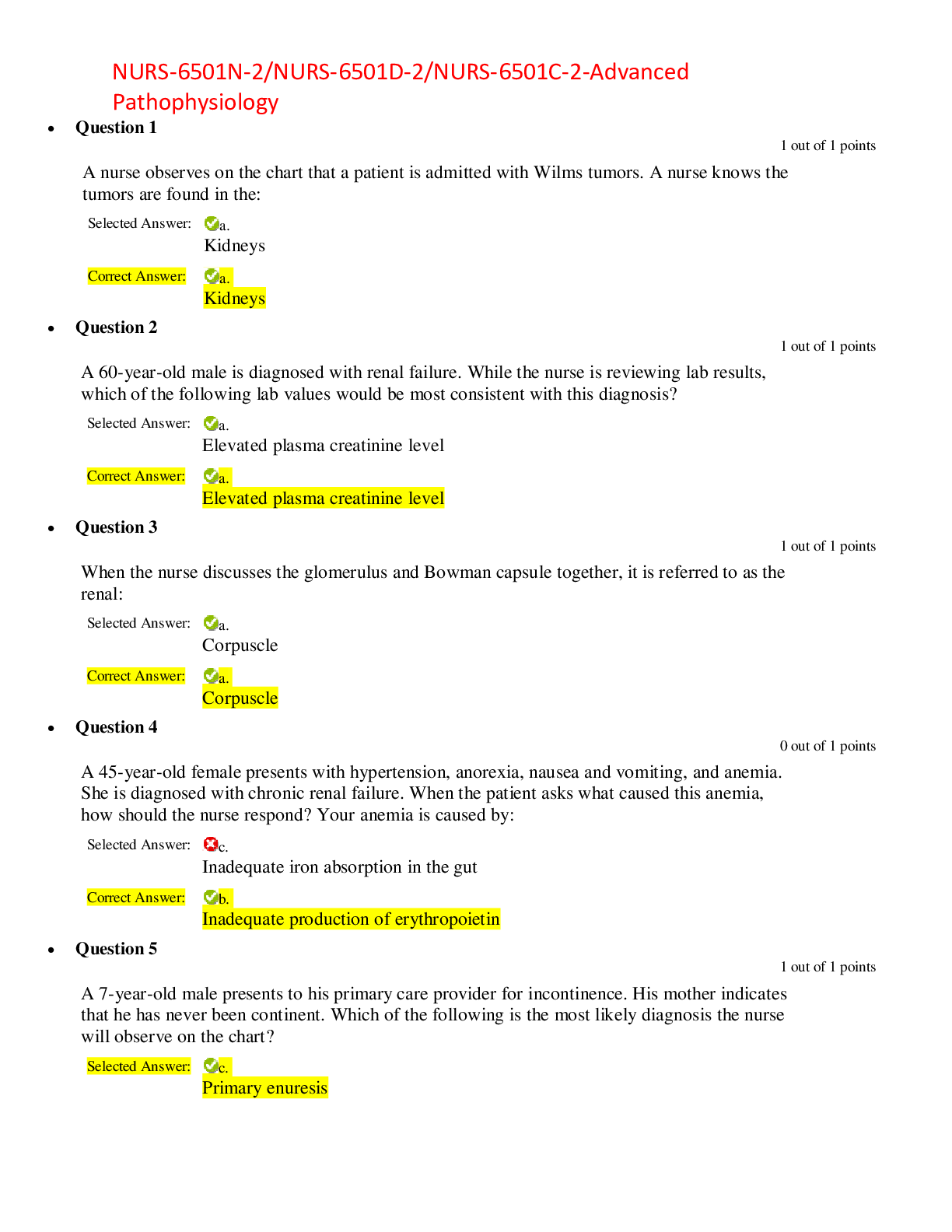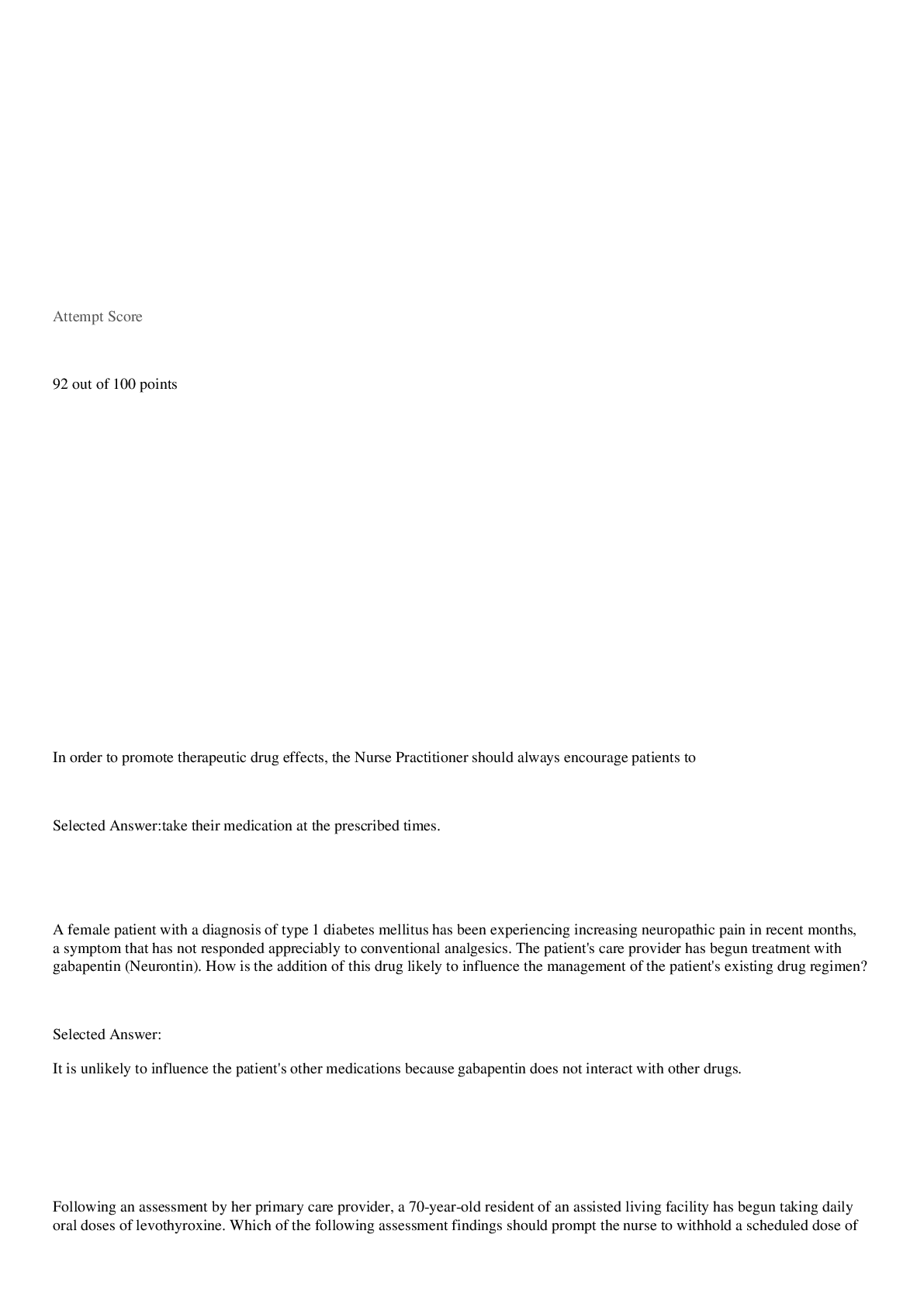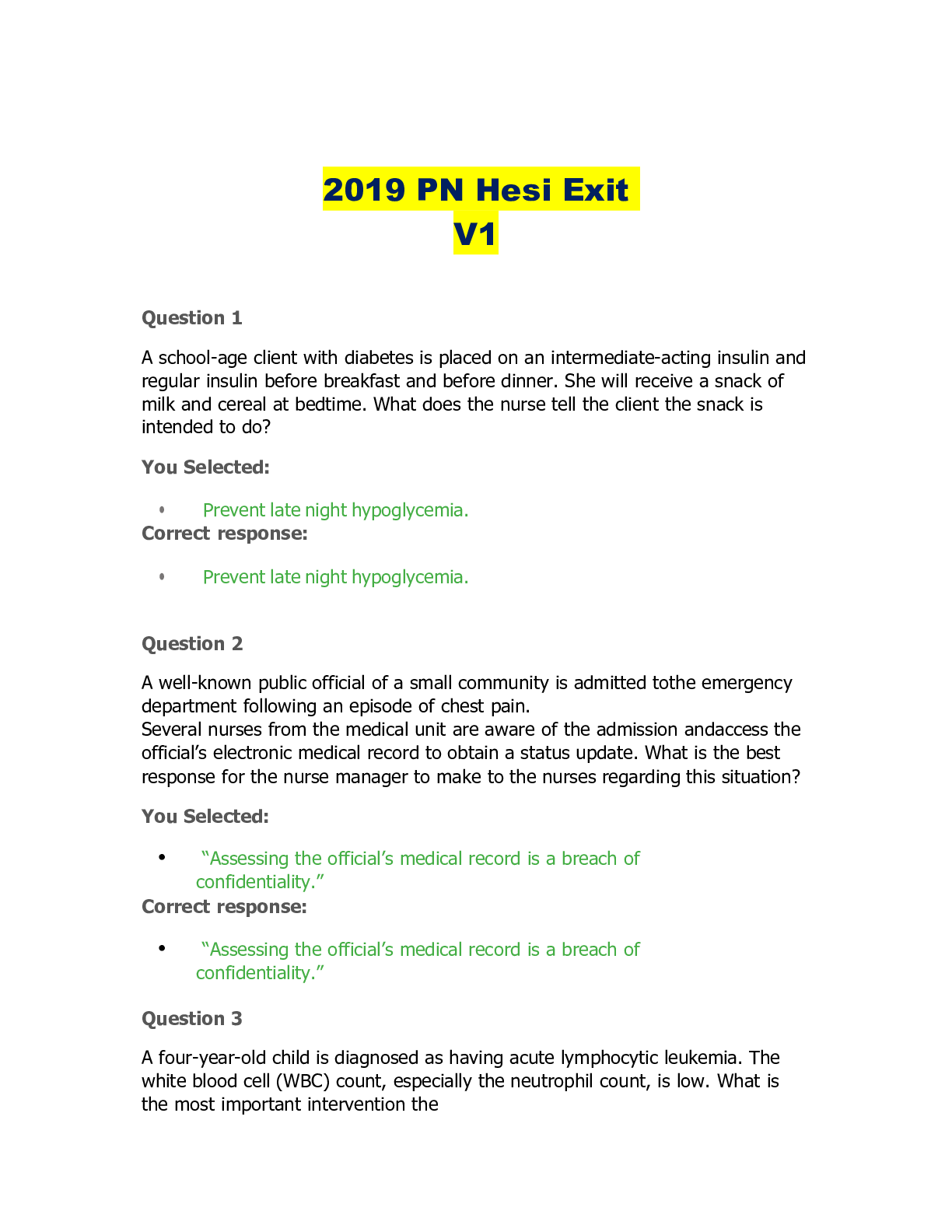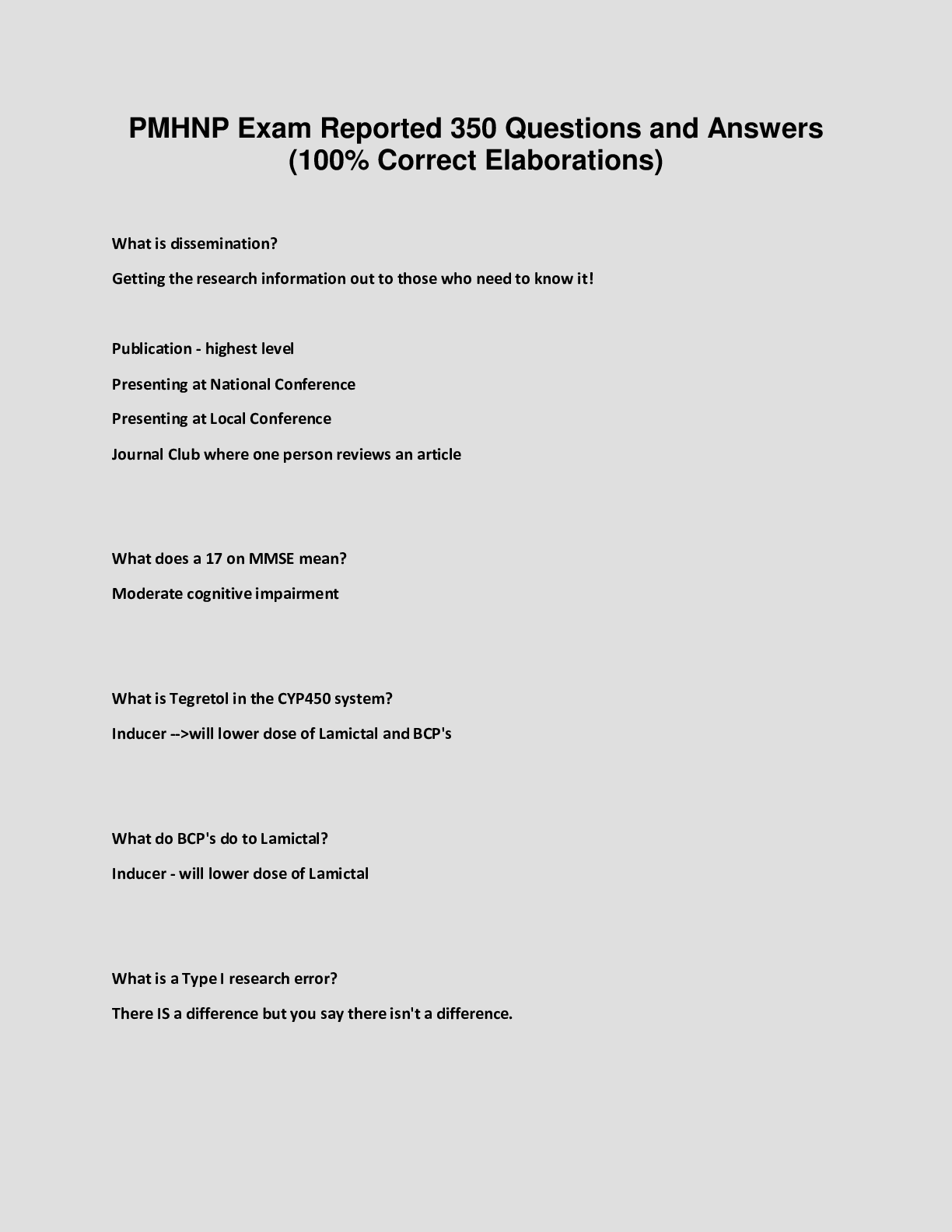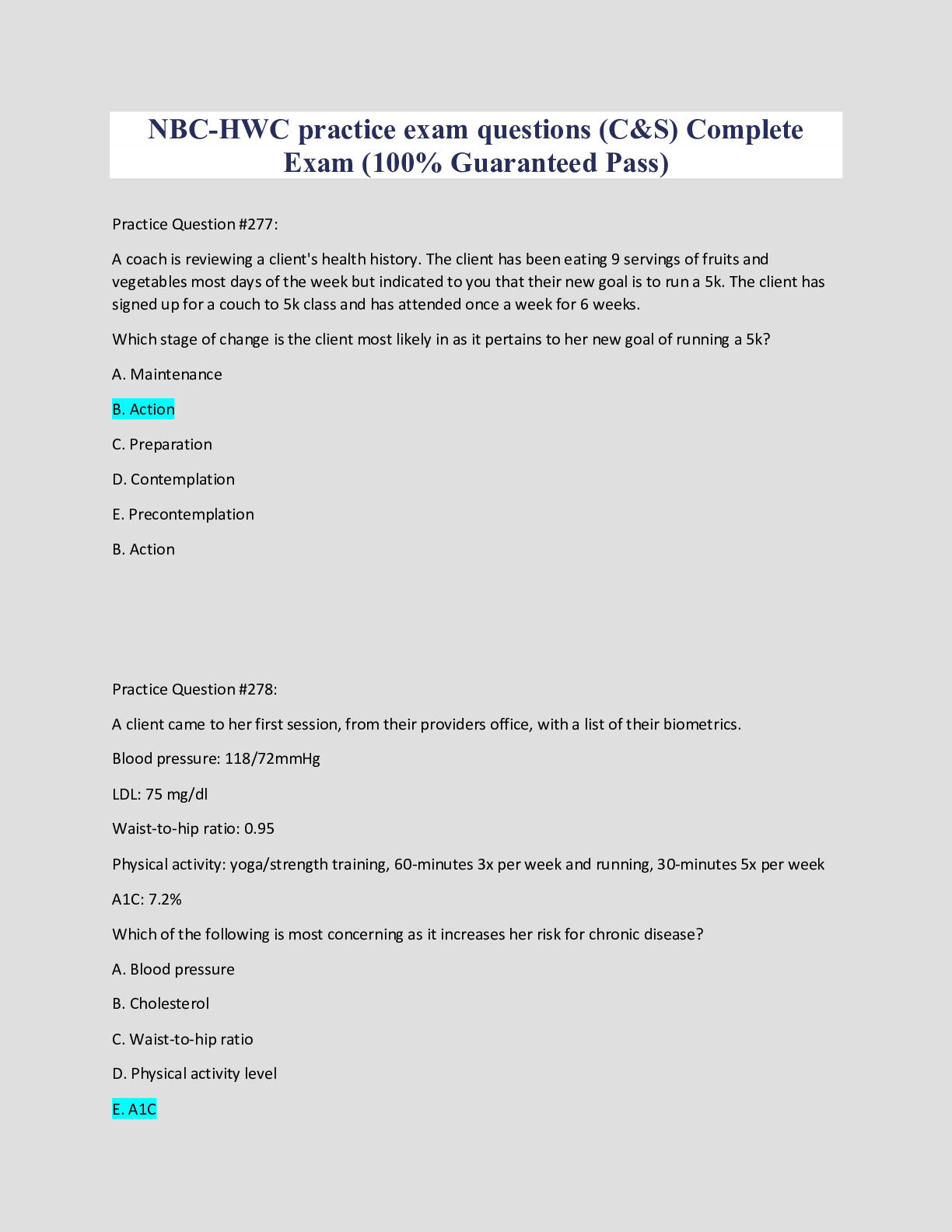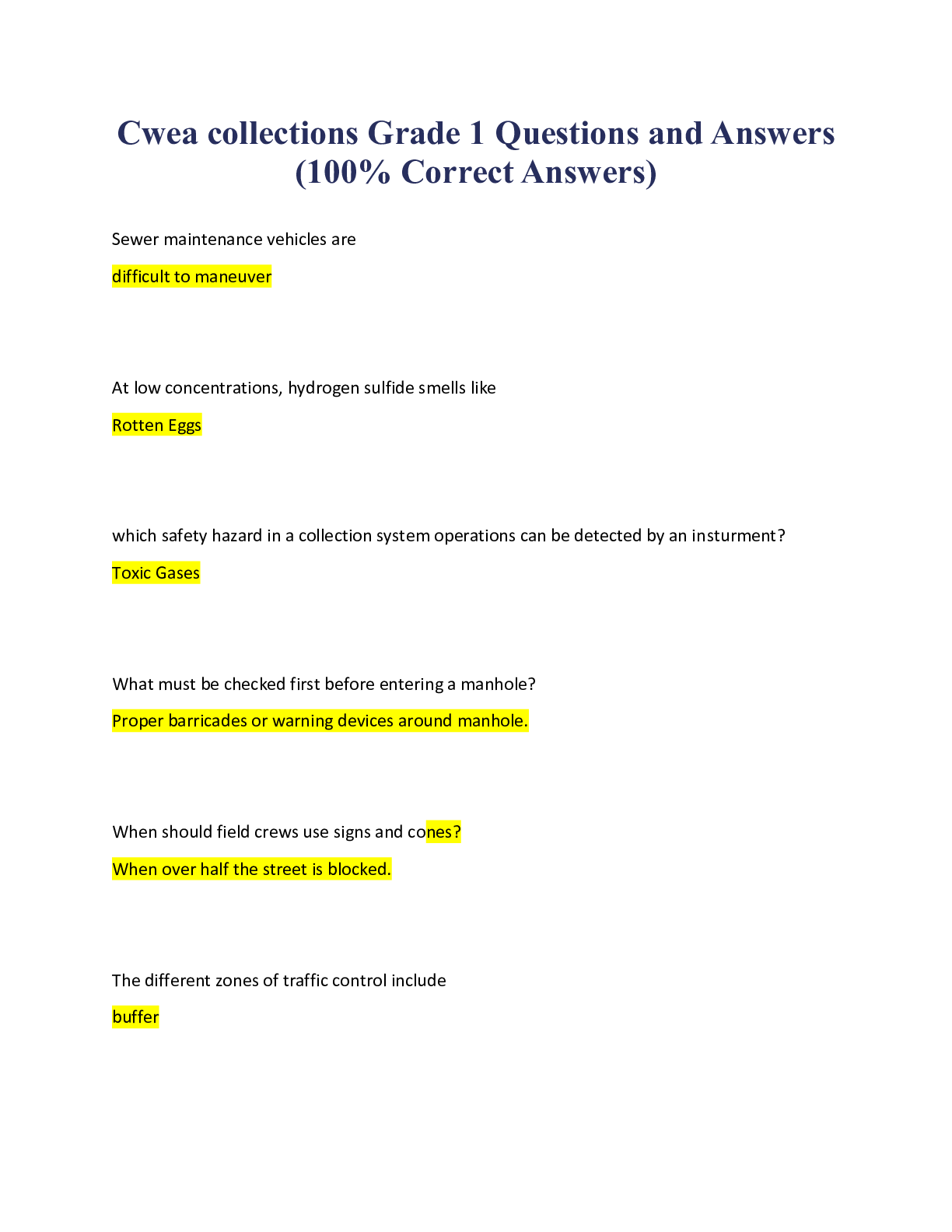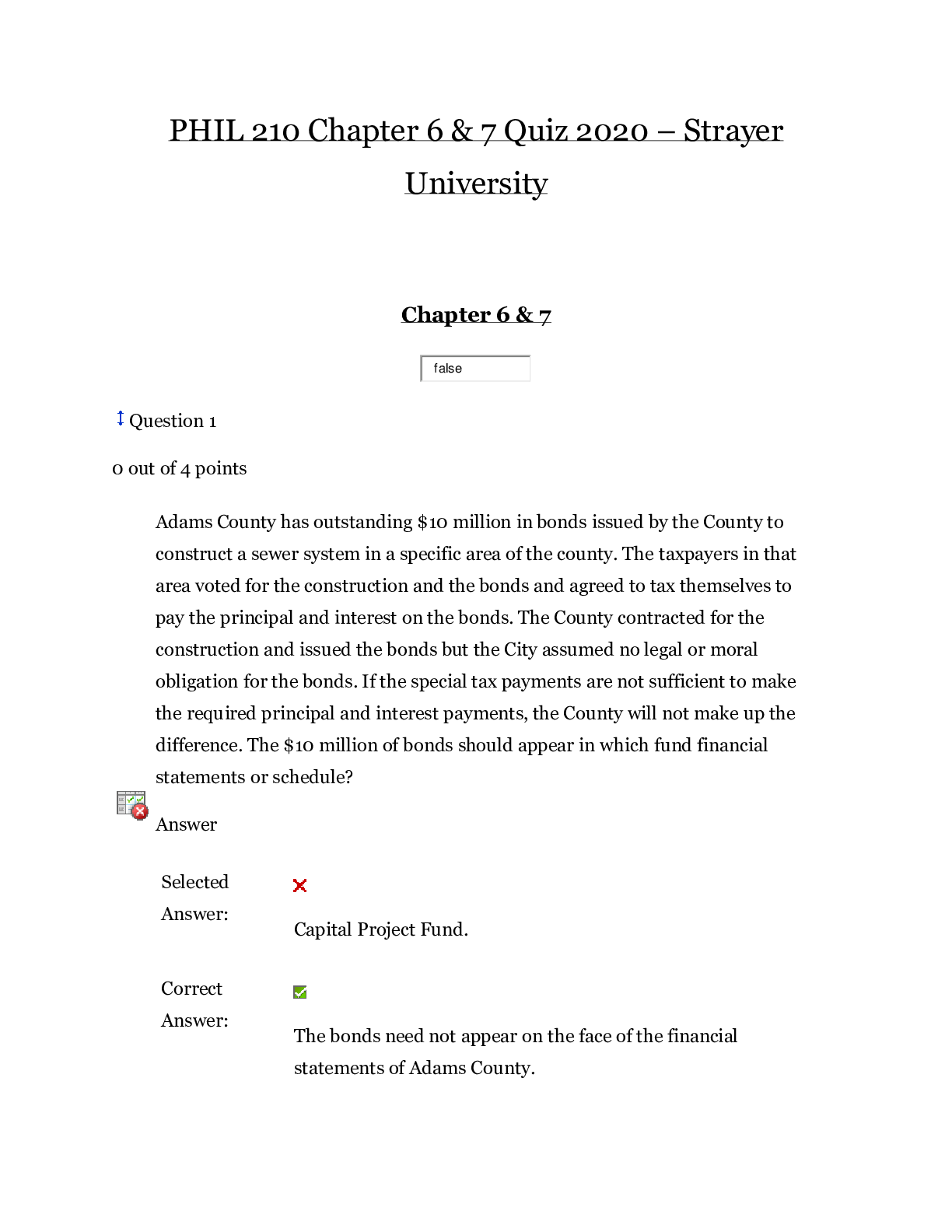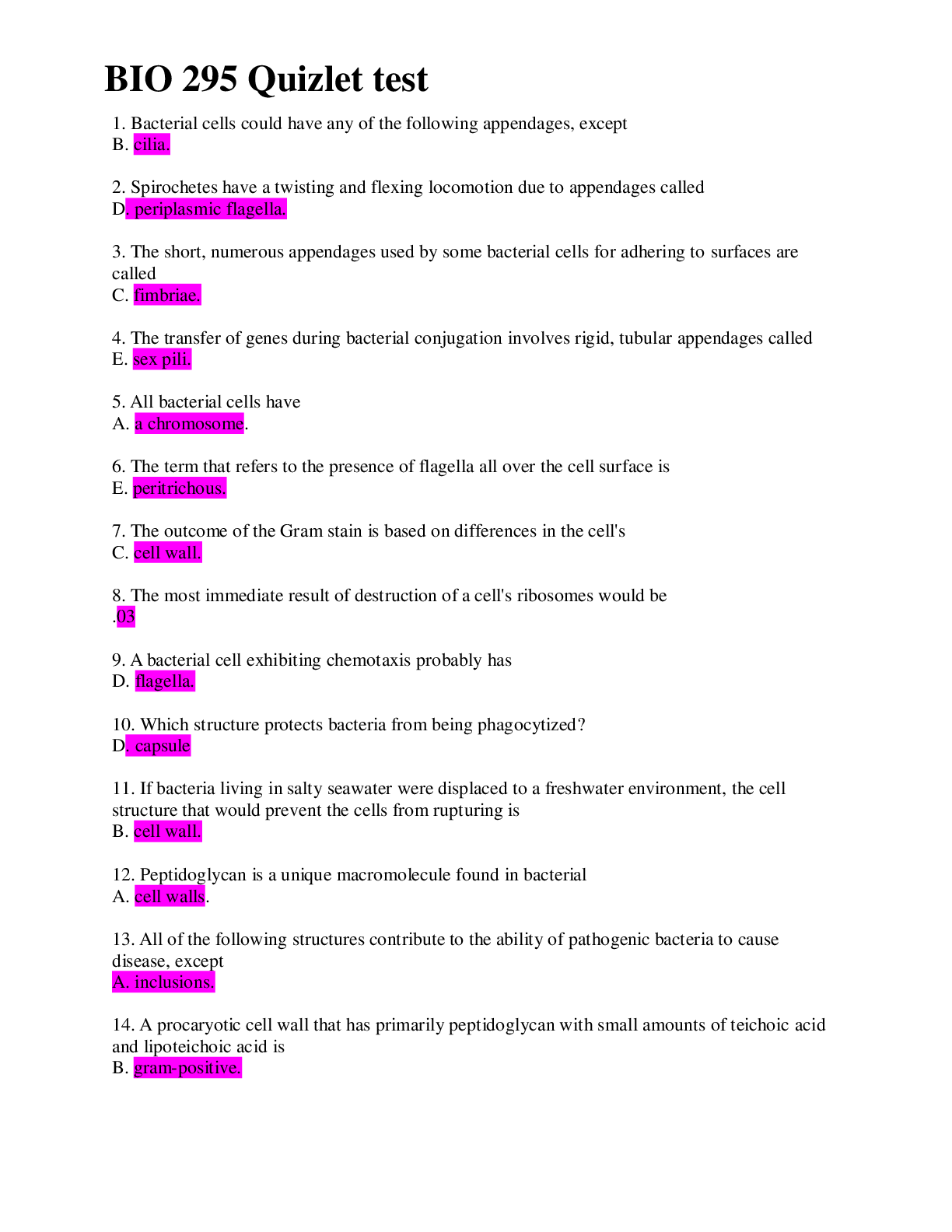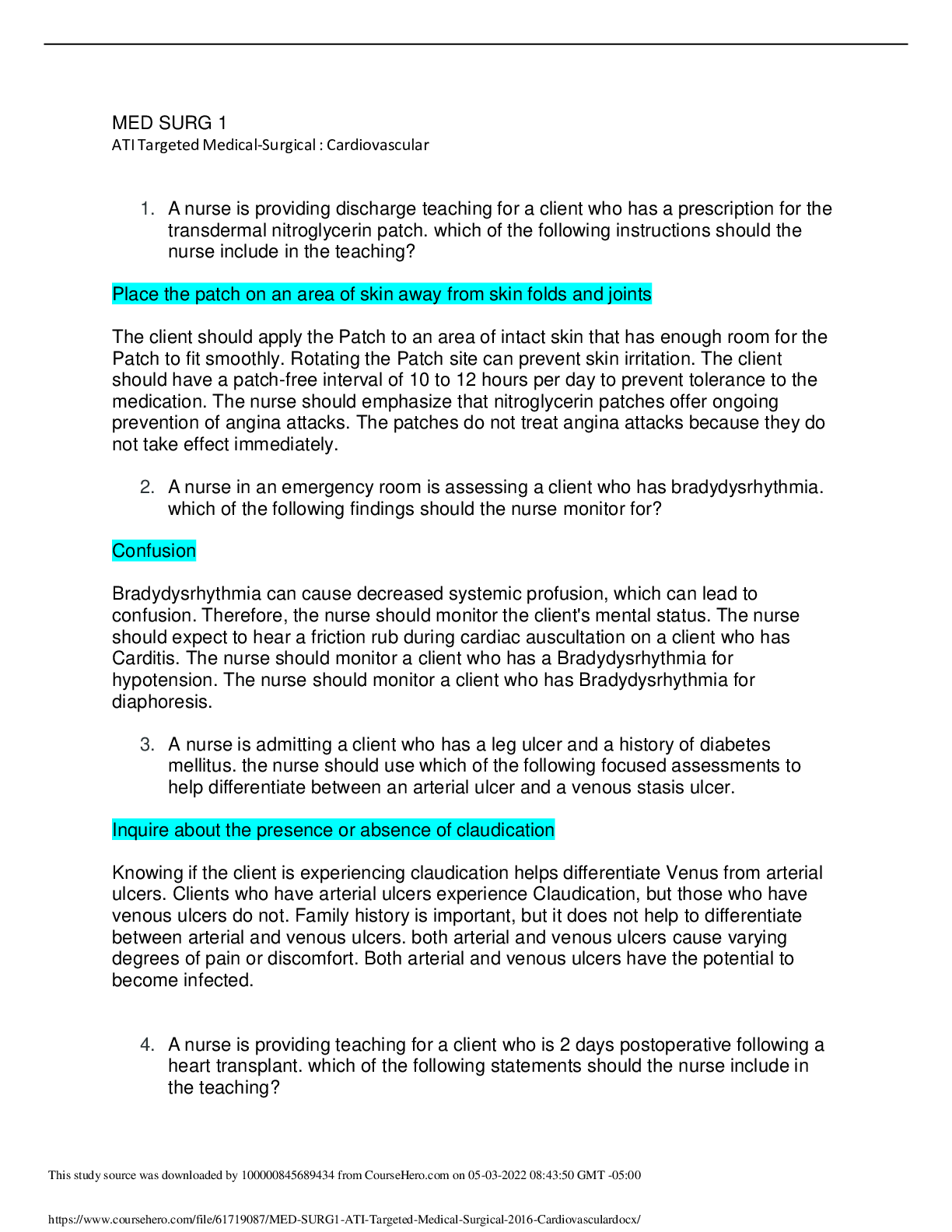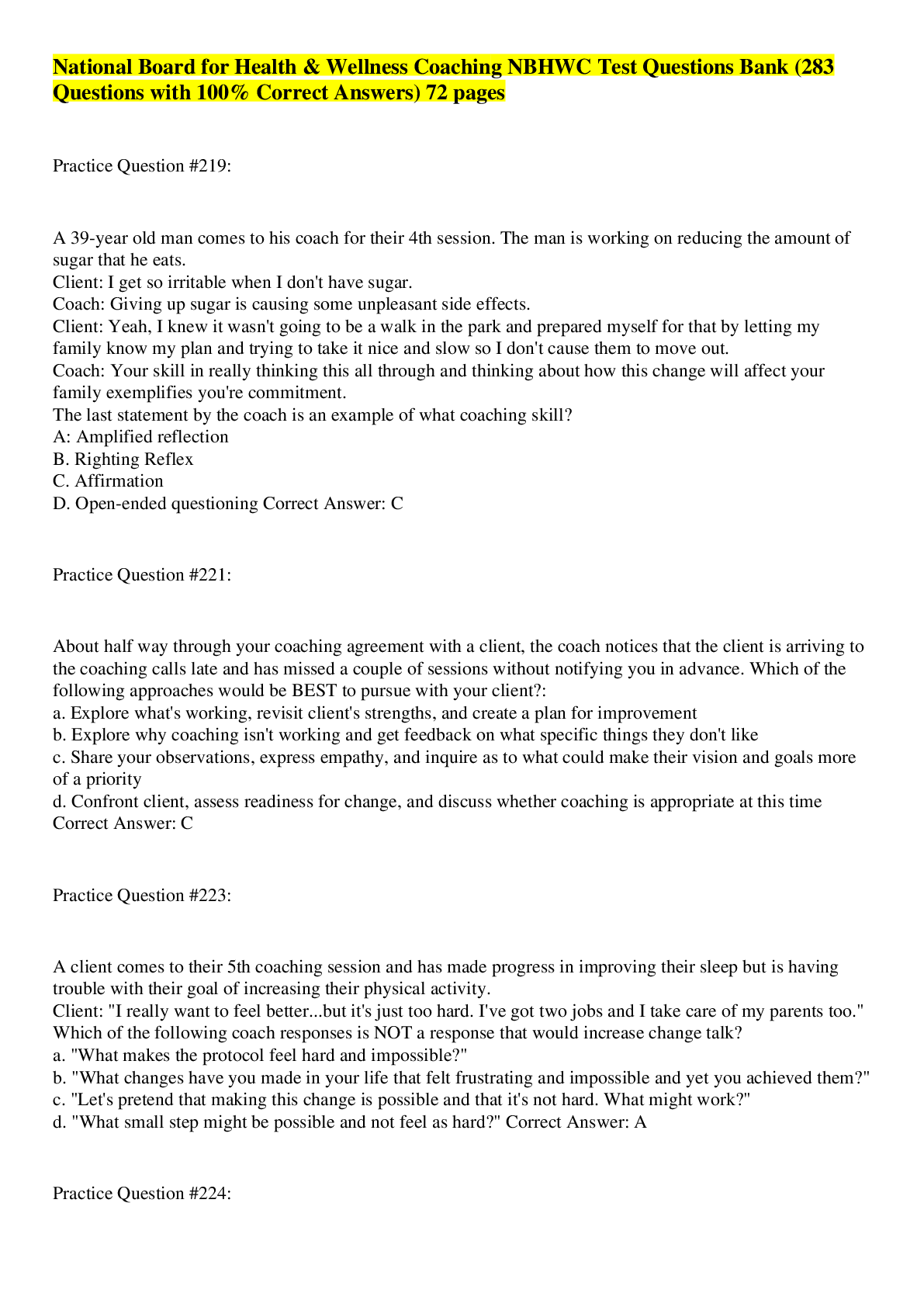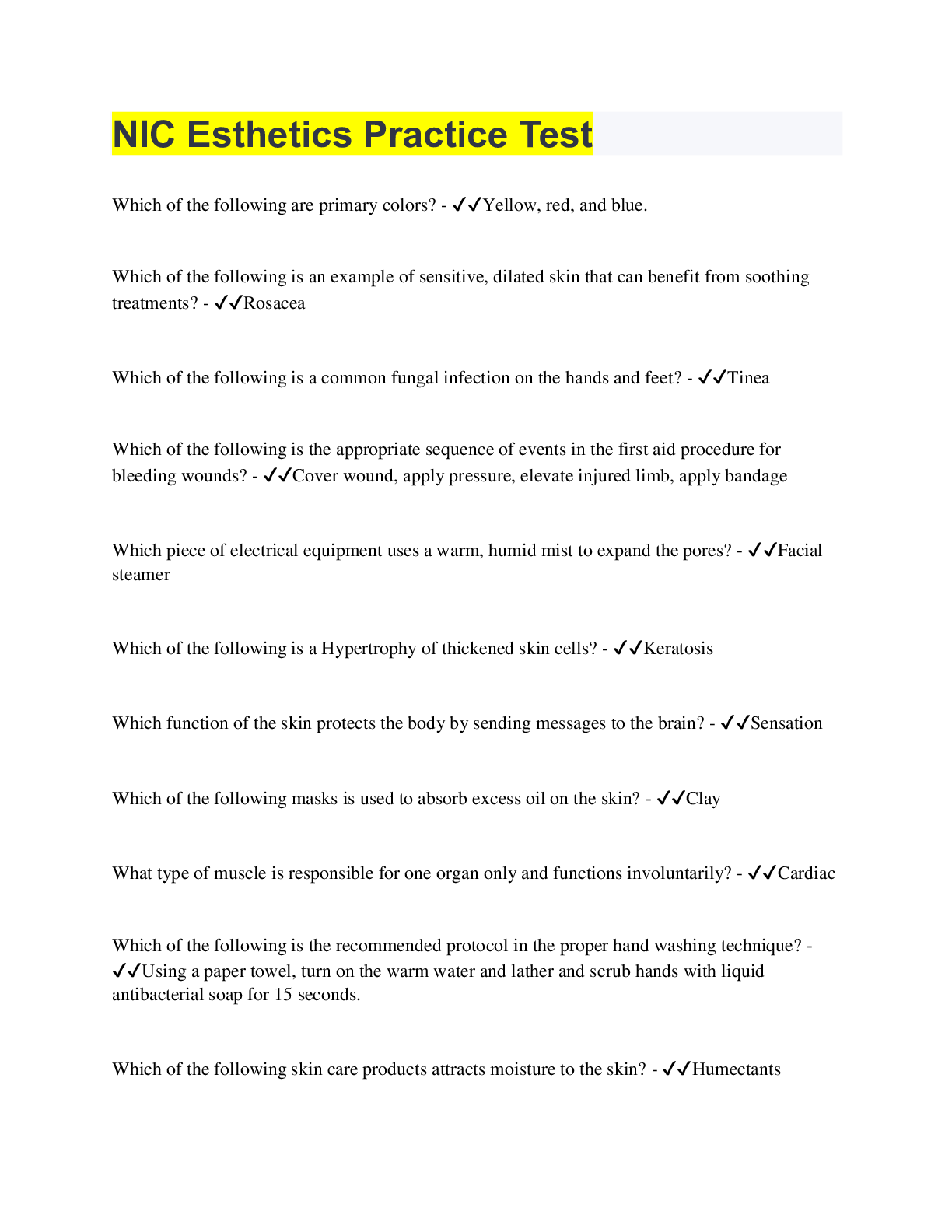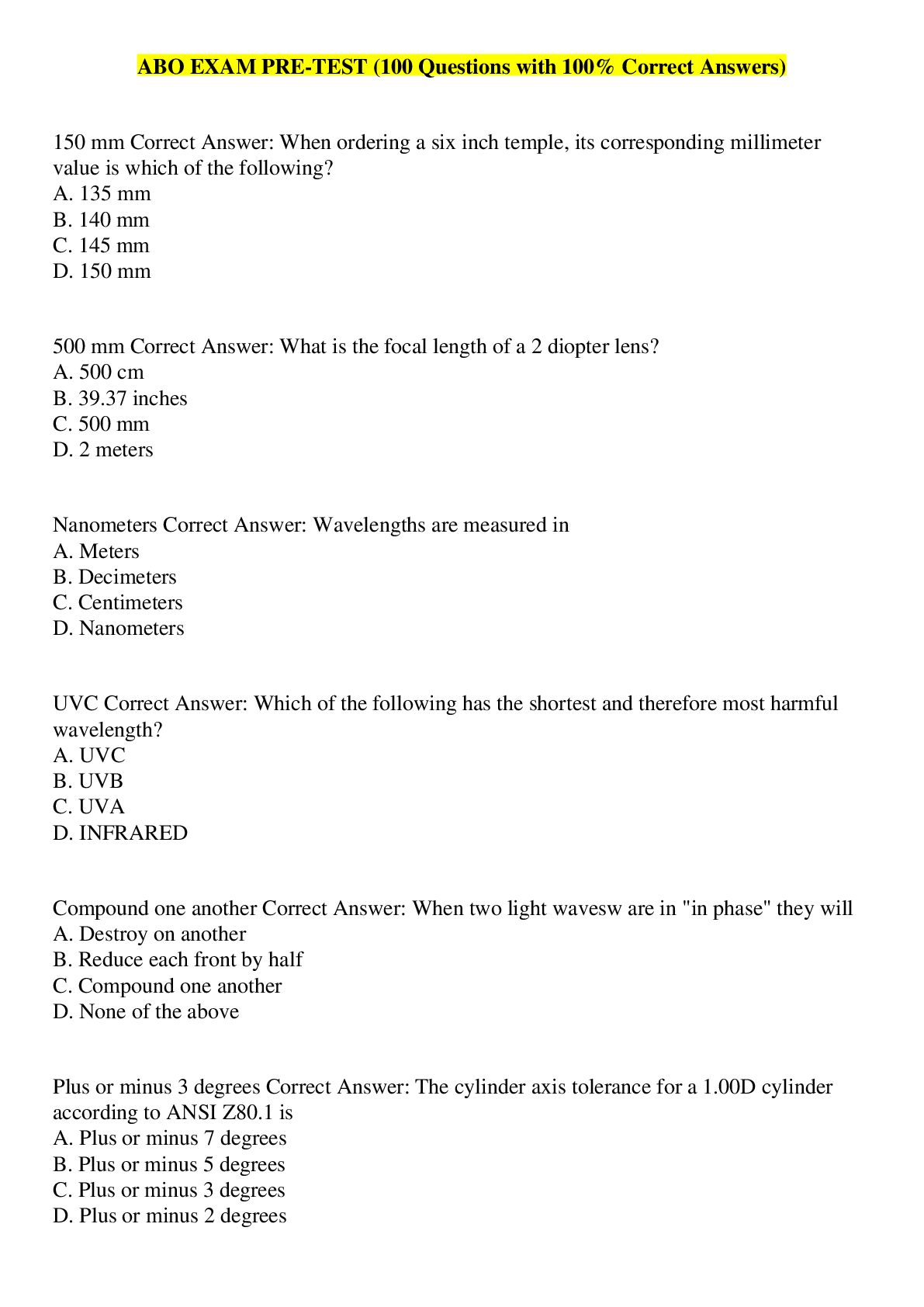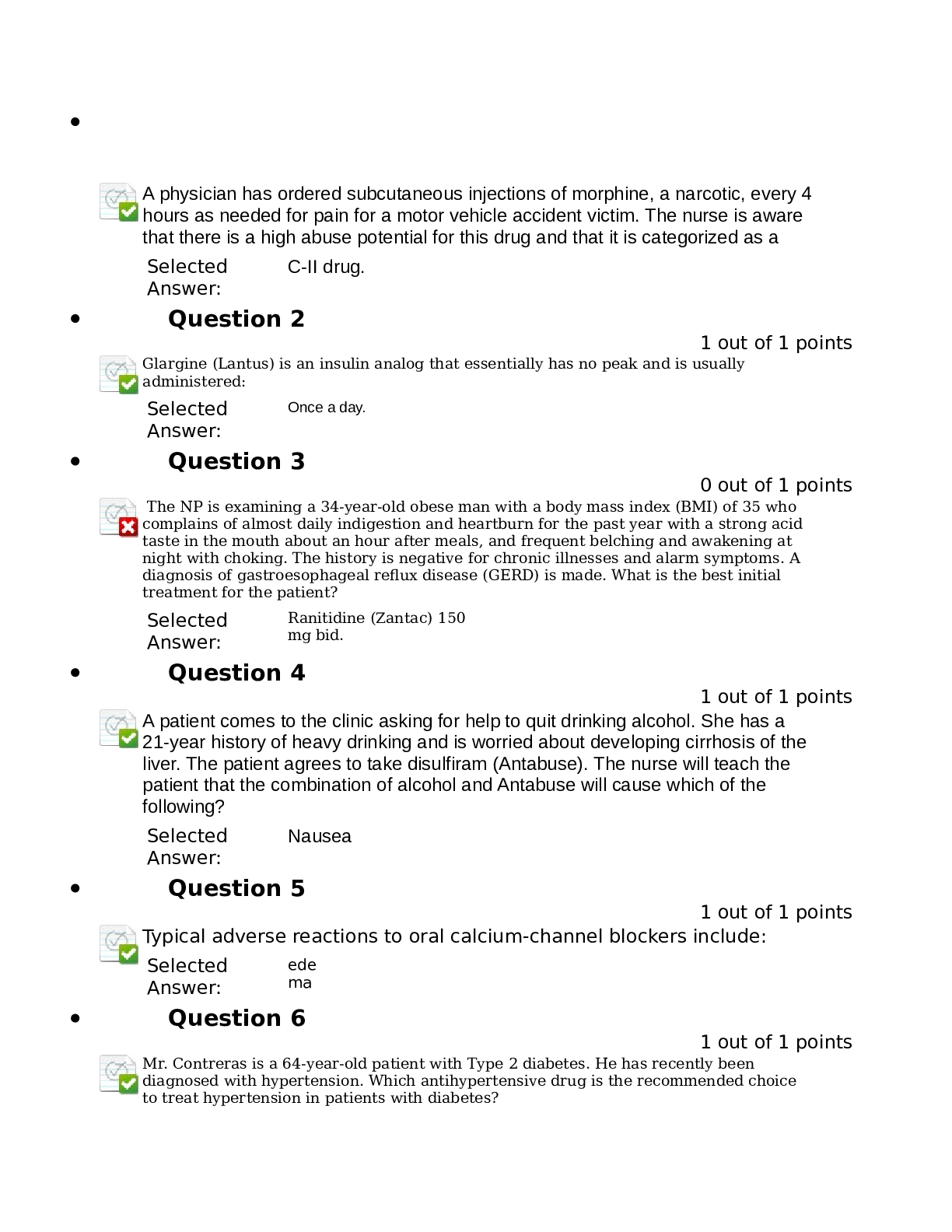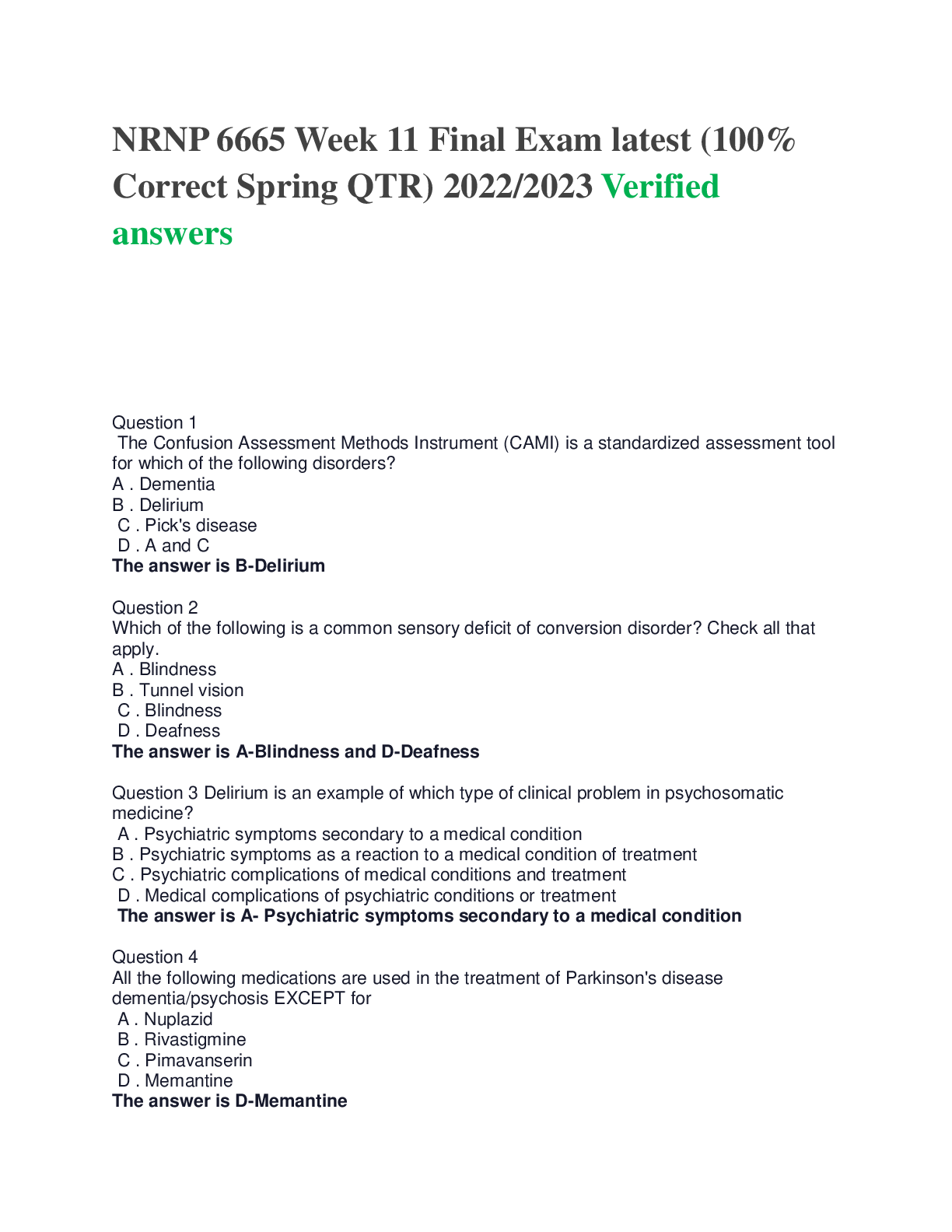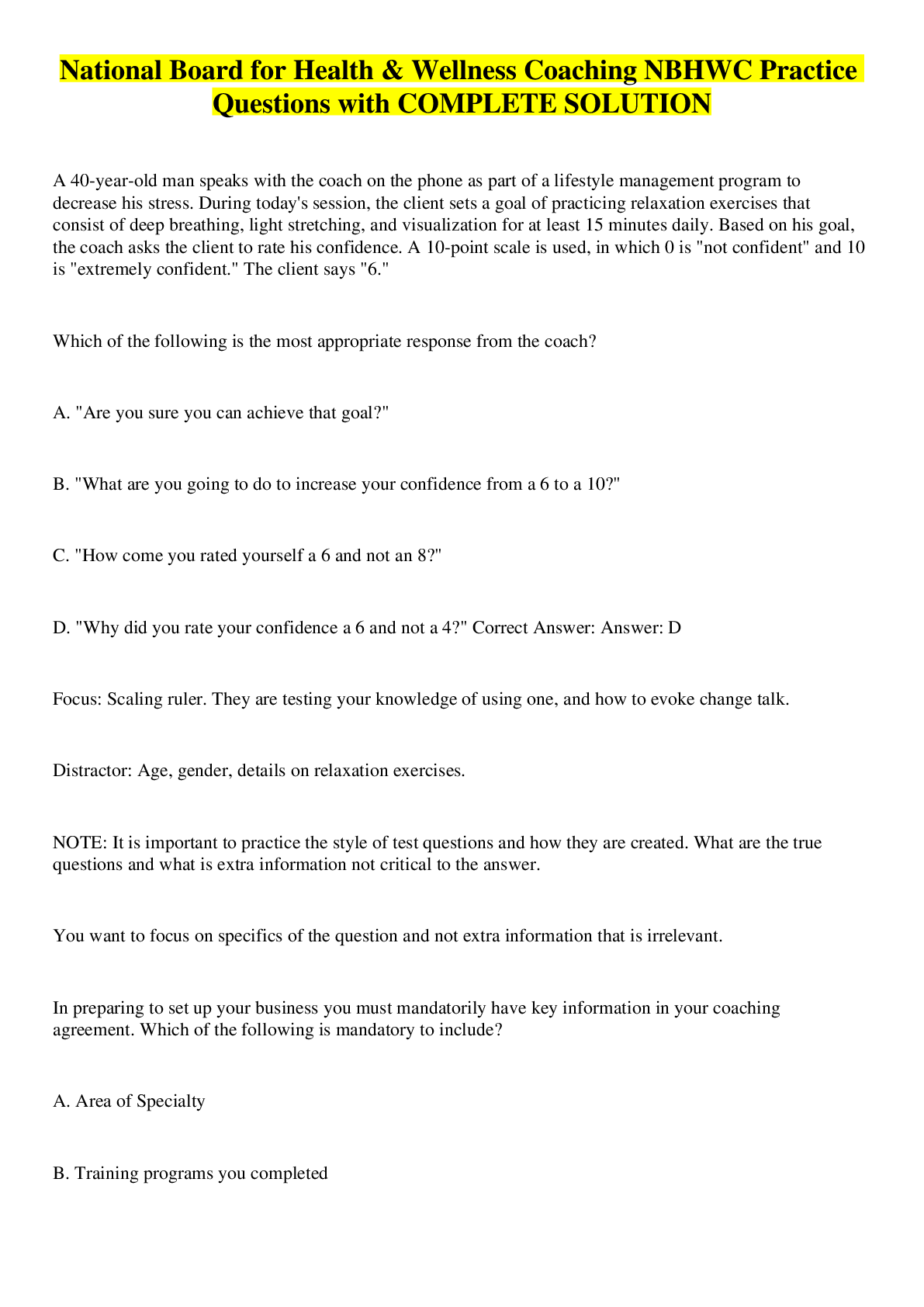*NURSING > EXAM > National Board for Health & Wellness Coaching NBHWC Test (100% Correct Answers) (All)
National Board for Health & Wellness Coaching NBHWC Test (100% Correct Answers)
Document Content and Description Below
Practice Question #219: A 39-year old man comes to his coach for their 4th session. The man is working on reducing the amount of sugar that he eats. Client: I get so irritable when I don't have su... gar. Coach: Giving up sugar is causing some unpleasant side effects. Client: Yeah, I knew it wasn't going to be a walk in the park and prepared myself for that by letting my family know my plan and trying to take it nice and slow so I don't cause them to move out. Coach: Your skill in really thinking this all through and thinking about how this change will affect your family exemplifies you're commitment. The last statement by the coach is an example of what coaching skill? A: Amplified reflection B. Righting Reflex C. Affirmation D. Open-ended questioning C Practice Question #221: About half way through your coaching agreement with a client, the coach notices that the client is arriving to the coaching calls late and has missed a couple of sessions without notifying you in advance. Which of the following approaches would be BEST to pursue with your client?: a. Explore what's working, revisit client's strengths, and create a plan for improvement b. Explore why coaching isn't working and get feedback on what specific things they don't like c. Share your observations, express empathy, and inquire as to what could make their vision and goals more of a priority d. Confront client, assess readiness for change, and discuss whether coaching is appropriate at this time C Practice Question #223: A client comes to their 5th coaching session and has made progress in improving their sleep but is having trouble with their goal of increasing their physical activity. Client: "I really want to feel better...but it's just too hard. I've got two jobs and I take care of my parents too." Which of the following coach responses is NOT a response that would increase change talk? a. "What makes the protocol feel hard and impossible?" b. "What changes have you made in your life that felt frustrating and impossible and yet you achieved them?" c. "Let's pretend that making this change is possible and that it's not hard. What might work?" d. "What small step might be possible and not feel as hard?" A Practice Question #224: Which of the following is recommended by MyPlate as part of a healthy diet: A. Total carbohydrate consumption should be less than 20g per day B. Total fat consumption should be less than 20% of daily caloric intake C. Eat a vegetarian diet 80% of the time D. Limiting trans and saturated fats D Practice Question #226: An 18-year old woman comes to her fifth coaching session to discuss her continued efforts to lose weight and get healthy. After the session, the coach receives an email from the woman's parents indicating they are paying for the sessions and would like to discuss their daughter's progress so far. What is the best response from the coach? A. I would be happy to set up some time. Please email me back potential times that will work for you. Also, your daughter must be present at this meeting. B. I am not able to discuss anything about my coaching services or any clients without prior written consent from the client. C. I will ask your daughter to give me permission and get back to you. D. I would be happy to set up some time what works for you? B Practice Question #225: A 42-year old man comes to his 5th coaching session eagerly working toward his goal of improving his relationship with his boss. Client: I tried to reason with her three times this week but my boss just didn't get it. She doesn't live in a world with reason and logic. She twice called me out in front of the group and on Friday told me I needed to step up my game AFTER I reached a major sales goal. Coach: A lot happened this week that seems frustrating. What is one thing that happened during the week between you and your boss that was an improvement from last month? The coach is demonstrating the use of what coaching technique? A. Empathy B. Amplified Reflection C. Use of Positive Psychology D. Righting Reflex C Practice Question #222: A 55-year old woman comes to her first coaching session having completed several wellness assessments. The coach asked the client to work on these assessments at the end of their first session for what purpose? A. An assessments help the client see what parts of the wellness wheel she needs to focus on improving B. Assessments help the coach figure out where to begin with this client C.Assessments are a tool coaches use with all clients as part of their scope of practice D. Assessments help the client reflect on her life and discover aspects of her wellbeing E. The coach can refer to these assessments later in their relationship to help move the client forward with her goals D Practice Question #220: Please LIKE the answer when posted to ensure more people see it. At the beginning of each coaching session, before contacting the client, a coach rings a small bell three times. This is an example of an activity to improve what coaching technique? a. Mindfulness b. Perceptive Reflections c. Appreciate Inquiries d. Affirmations A Practice Question #218: What is the main purpose of familiarizing yourself with your client's health risk assessment? A. To offer education and insight into their current health status B. To provide empathy, trust and greater understanding of their present life C. To assist in making goals around any biometric numbers that may need work D. To offer immediate referrals for any high risk behaviors B Practice Question #217: A 32-year old woman comes to her third coaching session to co to use to work on her eating habits. Specifically, the client is concerned about her sugar intake. Client: I plan to quit sugar. I am going to give it up completely for the next 6 months. Coach: Have you thought about taking a more gradual approach. What if you just decreased your sugar intake by a little bit each week? The coach is demonstrating what? A. Empathy B. Appreciative Inquiry C. Simple Reflection D. Righting Reflex D Practice Question #216: In the NBHWC Code of Ethics, there is mention of the "importance of recognizing and honoring the efforts and contribution of others and only claiming ownership of your own material." This component falls under which section of the code of ethics? A. Professional Conduct at Large B. Conflicts of Interest C. Professional Conduct with Clients D. Confidentiality A Practice Question #215: A client came to her first session, from their providers office, with a list of their biometrics. Blood pressure: 118/72mmHg LDL: 175 mg/dl Waist-to-hip ratio: 0.95 Physical activity: yoga, 60-minutes 3x per week and running, 30-minutes 5x per week A1C: 5.0% Which of the following is most concerning as it increases her risk for a heart attack? A. Blood pressure B. Cholesterol C. Waist-to-hip ratio D. Physical activity level E. A1C B Practice Question #214: Which open-ended question would be best if your client is in the stage of contemplation? A. What would have to happen that would signal you that it's time to start thinking about changing? B. What would be some pros and cons of making a change right now? C. What has worked for you in the past? D. Why make this change? B Practice Question #213: A 28-year-old female client is on her fourth coaching session. She has been struggling with stress as she does not get along with her current roommate. Client: I just don't know whether to move out or not. Coach: You should do whatever you think is best. Which of the 12 Thomas Gordon's Roadblocks to Communication did the coach demonstrate? A. Warning B. Shaming C. Telling people what to do D. Interpreting C Practice Question #212: A 35-year-old woman is on her fourth coaching session and has been working with a coach to manage her arthritis. She frequently gets flare-ups that set her back for up to a week. Coach: How is your arthritis impacting you today? Client: I have good days and bad days and today is a bad day. Coach: What does a bad day look like? Client: I had a flare up but I was able to repeat what I did last week and do some gently yoga and I felt much better. I know if I did more yoga I would probably feel better most days. The client's response to the coach's question about what does a bad day look like is an example of what? A. Change Talk B. Sustain Talk C. Decisional Balance D. Empathy A Practice Question #211: A 54-year-old man is on his ninth coaching session and has been working with a coach to manage his overall stress. He has made steady progress each week incorporating several stress management techniques such as deep breathing, keeping a consistent morning schedule, and doing more enjoyable things on the weekend such as reading. During his ninth session, he indicates he is having trouble concentrating and doesn't feel like eating much. When you ask how his reading on the weekends is going to help manage his stress he indicates that reading is not that fun for him anymore. Which of the following is the appropriate next step for the coach? a. Help the client explore other options for incorporating enjoyable things on the weekend. b. Refer the client to a mental health professional c. Explore reasons why he may be having trouble concentrating d. Reframe the situation and note all the amazing progress he has made. e. Affirm the client's strengths B Practice Question #210: Which of the following is NOT a CDC recommendation for proper sleep hygiene? A. Be consistent. Go to bed at the same time each night and get up at the same time each morning, including on the weekends B. Make sure your bedroom is quiet, dark, relaxing, and at a comfortable temperature C. Remove electronic devices, such as TVs, computers, and smart phones, from the bedroom D. Avoid eating or drinking anything before bedtime E. Get some exercise. Being physically active during the day can help you fall asleep more easily at night. D Practice Question #209: A 29-year-old man comes to his 4th coaching session ready to discuss the progress he has made on getting more sleep overall in the past two weeks. The following conversation ensues: Client: I knocked my first goal out of the park. Coach: What does that feel like; knocking a goal out of the park? Client: It feels incredible! I got 8 hours of sleep each day last week. I slept 4 hours each night and the. Was able to sneak in several power naps throughout the day and since they were power naps they added up to an additional 4 hours. Coach: Do you mean you took several naps the next day after sleep 4 hours the night before and those naps totaled an additional 4 hours. Client: Yep! I took a 1.5 hour nap at 10am and then a quick 30 minute power nap at 2pm which counts for double the time since it was a power nap and then another nap at 5pm for about 1.5 hours. Coach: You can't do that. We know from sleep science researchers that it is best if the 8 hours of sleep is continuous for the most part. You need to try to sleep 8 hours in a row. Client: Oh. So it doesn't even count then. Shoot, I totally thought I made my goal. What aspect of the conversation above would NOT be considered the coach approach? A. Asking what meeting the goal felt like B. Not asking permission before giving advice C. Talking 3 times as much as the client D. Asking clarifying questions B Practice Question #208: A coach noticed an advertisement in her local paper for another NBC-HWC certified health coach's services. The advertisement indicates that if people buy a 60-day supply of supplements the coach will give them 3 free coaching sessions. In addition, the advertisement indicates most people lose 30 pounds in 60 days. Which of the following is the reason why this advertisement violates NBC-HWC Code of Ethics? A. Coaching sessions are contingent upon purchase of supplements B. It's impossible to lose 30 pounds in 60 days C. The coach placed an advertisement in a paper D. None of the above A Practice Question #207: A 42-year old man comes to his coach for their 3rd session. The man decided to try coaching to get some help with trying to quit smoking cigarettes. Client: Whenever I try to quit I get really hard to live with. I'm not very nice. Coach: You really get irritable when you're withdrawing from nicotine. Client: Yeah. I know there's that gum that can ease ya down but I am thinking just doing to cold turkey and get it all over with. Coach: That's what fits you best. How could you do that? Client: I definitely need a plan for those early days. I think I'd need to be away form people for a couple of weeks in the wilderness (laughs).Coach: So you don't irritate other people. Client: For my protections actually. I still want to be married and have friends when this is all over. Coach: So overall you are not sure about getting through the really rough withdrawal part, you are worried that quitting cold turkey could affect relationships in your life, and what you will do during the early days of quitting. The last statement by the coach is an example of what coaching skill? A. Appreciative inquiry B. Summary reflection C. Affirmations D. Increasing self-efficacy B Practice Question #206: A 38-year-old woman comes to her fifth session. She is working with her coach to reduce the overall stress in her life. The coach and client get into a lengthy exploration of how the client starts her day. During this conversation the coach becomes aware that she is thinking about what to say next while the client is talking. The coach makes a quick note to practice more _____________? A. Sympathy B. Open-ended questions C. Amplified reflections D. Mindful listening E. Empathy D Practice Question #205: A client is on their 5th session and has set the goal to get better sleep in general most days of the week. Client: I slept horrible all week. Coach: Tell me about it. Client: I am very stressed at work and anyone with my stress wouldn't sleep well. Coach: Stress is the primary reason you didn't sleep well this week. Client: Yep. And anyone else that had the week I had would have done the same things. Coach: There was one behavior you zeroed in on last week which was no social media before bed to help with that too. How did that go? Client: There is no way I had any other choice. When work is this stressful using social media at night helps relax me. Discord may appear during a coaching session. Which of the following best categorizes the type of discord the client may be exhibiting? A. Defending B. Interrupting C. Disengagement D. Questioning A Practice Question #204: Your client is going to be assessed for obesity at his next visit. The ______ measurement is best for assessing visceral fat. A. Abdominal skinfold B. BMI C. Waist circumference D. Hip circumference C Practice Question #203: A client comes to you as part of their company's insurance benefit program. They receive a reduction on their premium if they attend five coaching sessions. The client was referred to the program because their health risk assessment indicated they are a current cigarette smoker. Your client is very clear they have no interest in quitting at this time. Which open-ended question would be best given the clients lack of interest in quitting? A. Tell me about the last time you tried to quit and what didn't work for you? B. What would be some positive aspects of changing right now? C. What does your life look like as a non-smoker? D. What are some positive aspects of not changing right now? E. What would have to happen that would signal you that it's time to start thinking about changing? E Practice Question #202: A coach owns her own business and specializes in coaching around diet, energy levels, and weight loss. She is promoting gut biome supplements that will help her clients lose 20 pounds in four weeks if they take the supplement daily. The coach is most likely violating which of the following guidelines: A. NBC-HWC Code of Ethics B. HIPAA Laws C. USDA Nutritional Guidelines D. Confidentiality/Privacy A Practice Question #201: A client is a 40 year-old Latino man who has a BMI of 24. He has a sister recovering from cancer and was diagnosed was recently diagnosed with anxiety. Which of the is considered a risk factor for your client for type 2 diabetes? A. Age B. BMI C. Ethnicity D. Sister with cancer C Practice Question #200: Jamal is a wellness coach and also sells supplemental shakes to his coaching clients in which he makes a commission. At what point in the coaching relationship must Jamal disclose this information to his client per the NBC-HWC ethical guidelines? A. At some point during the coaching relationship. B. Before the sale is made to the client. C. At minimum, after the sale to the client. D. Before any coaching begins. D Practice Question #199: Coaches are often encouraged to make observations not evaluations. For example, "you drank 1 glass of water each day last week" is an observation vs. the evaluation of "you failed at meeting your goal of drinking 3 glasses of water a day". This tenet of observation vs. evaluation is an example of: A. Non-violent Communication B. Sympathy C. Stages of Change D. Self Determination Theory A Practice Question #198: A client is in their third session and is indicating some ambivalence about making a change to eat healthier. Coach: Would you be open to exploring all sides of this? Client: You bet. Coach: Let's talk through the pros and cons of changing and the pros and cons of staying the same. Where would you like to start? Client: Let's start with the pros and cons of trying to eat healthier. The skill the coach is demonstrating is: A. Enhancing self-efficacy B. Double-sided reflections C. Appreciative inquiry D. Exploring decisional balance D Practice Question #197: Client: All food is bad depending on what you read. First coffee is good then it's bad for you. Everything gives you cancer. It is all so crazy. Coach: Sifting through all the information is confusing and it's hard to know what is true. Where seems reasonable to focus first? Client: I want to get my head around how much fat to eat. How much should I eat in a day? Coach: Woukd it be ok if I shared some specifics? Client: Sure Coach: Fats are an important part of a healthy diet. There are different types of fats and some are better than others. It is better to eat more unsaturated fat vs. saturated fat. Does that make sense? What else can I tell you about it? Which of the following motivational interviewing technique is the coach demonstrating? A. Developing Discrepancy B. Elicit-Provide-Elicit C. Increasing Change Talk D. Rolling with Resistance B Practice Question #196: Which of the following best explains nonmaleficence as it relates to ethics in coaching? A. Respect for human freedom and dignity B. Pros must outweigh the cons C. Do no harm D. Fairness C Practice Question #195: In session #2, the coach and the client decide to explore the client's vision of his/her optimal health. Coach: Have you ever thought about what your future might look like? Client: No not really. Coach: What is your understanding about creating a vision? Client: It's like setting some goals for the future. Coach: It's kinda like that but more just creating a picture in your head of what something may look like that you want to create for yourself. Do you want to create a vision for your future health? Client: That sounds good. Coach: I would like you to close your eyes and sit quietly for a minute. After a minute, I am going to guide you through an activity where we look toward the future and try to visualize what that looks like. Client: So I keep my eyes closed the whole time? Coach: Yep. I just want you to try to see in your mind what the future might look like. Client: O.K. Coach: Are you ready and comfortable? Client: Yes. Which part of the above conversation exemplifies the coach approach of honoring the client's autonomy. (Muth, 76) A. Exploring creating a vision during the second session B. Asking permission to do the visualization activity C. Asking open-ended questions D. Guiding the visualization activity. B Practice Question #194: A client has just completed their well-being assessment prior to their first coaching session. The client's biometric information included the following: Male Age: 45 Nurse Blood Pressure: 110/70 mmHG Total Cholesterol: 185 ml/dL BMI: 24 Fruits/Vegetables: 9 servings per day Physical activity: Runs 2x week for 30 minutes Which of the following would be the most concerning to the coach in the context of recommended health guidelines? A. Blood pressure B. Total cholesterol C. Fruits/Vegetable intake D. Physical activity level D Practice Question #193: A client meets with her coach for their 15th session. Over the course of the past year, the client has met and even surpassed many of her goals. Her most recent goal is to wake up early twice per week to have the time to prepare a healthy breakfast. Client: I have tried every tip I can think of. I've stated to go to bed earlier, I have all the ingredients I needed purchased ahead of time, I asked my partner to get the kids in the morning so I can have to time to cook breakfast and none of it has worked. I hit snooze each time for the past 4 weeks and didn't once wake up early. I am not making any progress at all and I've met every other goal. Seriously, how lazy can I get? Coach: You set a goal and have tried many strategies to set yourself up for success and are feeling defeated because you did not meet the goal one time. Which coaching skill is the coach demonstrating? A. Empathy B. Amplified Reflection C. Evoking change D. Summary reflection D Practice Question #192: A 40 year old man comes to the coach's office for his 11th session to help him reach his goal of getting more and higher quality sleep. He set a goal each week to focus on decreasing his screen time at night. Client: I reached my goal this week and reduced my screen time by 50%. Coach: You worked really hard and succeeded at reaching your goal. What coaching skill is the coach demonstrating? A. Open-ended questioning B. Affirmations C. Empathy D. Strengths-based coaching B Practice Question #191: Which of the following questions would be most appropriate to ask first when exploring the topic of accountability regarding an action step a client set for themselves and was not able to accomplish? A. What did you learn from this experience? B. What do you think went wrong? C. What were the barriers that caused this failure? D. How do you think you need to change your behaviors since you did not accomplish your goal? A Practice Question #190: As part of the coaching agreement, a coach offers an additional 3 coaching sessions for free if the client purchases a massage package from them as well. The following scenario is: A. Acceptable because the additional coaching sessions are free B. Unacceptable because the offer is a conflict of interest per the NBHWC Code of Ethics C. Acceptable given the 3 free sessions were included as part of the coaching agreement. D. Unacceptable as it is a violation of the professional code of conduct at large per the NBHWC Code of Ethics. B Practice Question #189: While coaching agreements can vary, most coaching agreements include which of the following? A. Confidentiality, Client's Vision, Client's goals B. Logistics, Client's Biometric Measurements, Appointment Cancellation Policy C. Confidentiality, Responsibilities and Expectation of the Coach, Responsibilities and Expectations of the Client D. Client's Biometric Measurements, Client's goals, Coach Fee Structure C Practice Question #188: The DASH eating plan helps individuals lower their blood pressure. One of the ways it does this is by limiting sodium intake. Which of the following is the recommended maximum sodium intake per day recommended? A. 2500 mg B. 2300 mg C. 1800 mg D. 1200 mg B Practice Question #187: A client is reviewing her wellness assessment with her coach. The client's health behaviors includes the following: A. Servings of veg and fruit per day =11 B. She walks 2x per week for 20 minutes C. Drinks 1 glass of wine each day/5 days per week D. Does not use tobacco Which of these health behaviors is most concerning as it relates to increasing ones risk for hypertension? B Practice Question #186: A client is on his 5th coaching session. The coach and client have spent the last 5 minutes exploring the client's desire to work on changing his eating habits specifically around portion sizes. Coach: "You seem really energized whenever you talk about be mindful of your portion sizes. Tell me more about that." Client: "Working on portion sizes seems like a realistic first step I can make. I've gotten familiar with what reasonable portion sizes look like and have already gotten familiar with reading labels in regards to their portion sizes. Plus I have the time to dedicate to this change". The client's response to the coach's question is most likely an example of what? A. Sympathy B. Bottom-lining C. Change talk D. Motivational ruler C Practice Question #185: A coach centers their practice around supporting their client's autonomy, building competence, and social-support/connection. This coach is most likely centering their practice on what theory? A. Stages of Change B. Self-determination C. Appreciative Inquiry D. Social-cognitive B Practice Question #184: Please choose the best answer from the list. Goal setting is very common in coaching because research supports that those who set goals increase their ability to: A. Persist B. Focus on goal-irrelevant activities C. Be ambivalent D. Be compassionate toward others A Practice Question #183: A client comes to her fourth coaching session to continue working on her intent to quit smoking someday. She starts out the call by simply saying "I don't know if quitting is really worth it." Prochaska & Prochaska would define this as a statement of doubt which often leads to delay in making any change. The client is most likely in what stage of change? A. Precontemplation B. Contemplation C. Preparation D. None of the above B Practice Question #182: A coach is a member of the exclusive group on Facebook for NBC-HWC coaches. Only those certified by the NBHWC are permitted in this group. To help a friend who has developed a new software, the coach downloads the names of each person in the group and provides them to their friend so that they can implement a marketing campaign to sell this new software to coaches. The above scenario is a violation of which part of the NBC-HWC code of ethics?: A. Professional Conduct at Large B. Conflict of Interest C. Professional Conduct with Clients D. Confidentiality/Privacy A Practice Question #181: A client has submitted their wellness assessment to their coach. There biometric numbers include the following: Blood Pressure: 110/78 mmHg BMI: 23 Total Cholesterol: 155 mg/dl HDL: 30 Which of the following might the coach note as a general concern? A. Blood pressure B. BMI C. Total cholesterol D. HDL D Practice Question #180: A 35 year old woman comes to her third coaching session. She has set a goal to lose 20 pounds in 6 weeks. The woman is clearly upset with herself for not losing any weight so far, especially now that she has hired a health coach. Client: I haven't lost a single pound in three weeks. Coach: That's frustrating. Client: No kidding! I am so frustrated. There is just no time. Coach: Tell me more about not having time. Client: I have no time to work out or meal prep. It's just not possible right now. Which of the following would be amplified reflection in response to this last statement by the client? A. There is just no time. B. You don't have time but yet you have these goals you've set. C. You will never have the time to meal prep or workout so it's likely losing weight will not be possible. D: Finding time to be healthy is hard. C Practice Question #179: A client is working on quitting smoking and has indicated he's had a really hard week. He went out with friends twice this week and ended up smoking with his friends. As a coach it is critical in these moments to: A. Use double-sided reflections B. Provide unconditional positive regard C. Discuss why he chose to smoke with his friends D. Ask him about other friends he has in his life B Practice Question #178: A coach is in the middle of a first coaching session and recognizes that his client often makes statements using the words "I won't" or "I can't". It is likely this client is in what stage of change? A. Precontemplation B: Contemplation C. Preparation D. Maintenance A Practice Question #177: A 60 year old man is meeting with his coach for their 6th session. The client has been working toward trying to improve his sleep habits but has been struggling. Client: I failed to get to bed before 11:00 pm everyday this week but Wednesday. On Wednesday I got to bed at 10:00. Coach: You went to bed before 11:00 pm on Wednesday. The coach has reframed an evaluative statement to a statement of observation. This technique is considered a tenant of what coaching skill? A. Empathy B. Appreciative Inquiry C. Stages of Change D. Nonviolent Communication D Practice Question #176: A 48 year-old, female client is on her fifth coaching session and has made some progress toward her goal to eat a serving of fruit and a serving of vegetables every day at work for lunch. She indicated that she does struggle the most whenever her co-workers go out to lunch because she either has to decline or when she goes with them she ends up not meeting her goal for that day. During the coaching session, a coach would most likely focus on: A. Building the client's willpower B. Listing the reasons why the client should not eat out C. Exploring the benefits of eating alone D. Exploring what the client feels is most important in this situation D Practice Question #175: When coaches ask about the pros and cons of making a change and the pros and cons of not making a change they are engaging in what coaching activity? A. Growth mindset B. Active listening C. Empathy D. Decisional Balance D Practice Question #174: A client has requested that what she is about to talk to you about not be put in her record, your electronic coaching notes, or even written down. Which response is most appropriate? A. "Your confidentiality is important to me and I will not put anything in your record, in my electronic notes, or write anything down." B. "I am required by HIPAA to keep a record of everything." C. "I am happy to honor your confidentiality but if it is anything do with a health-endangering behavior or something illegal for example I will not be able to keep that private." D. "Everything you say to me is 100% confidential." C Practice Question #173: A coach has his NBC-HWC and a degree in psychology. His client describes an ankle injury he recently got running. He says that his ankle is bruised and he can't really run on it anymore and it hurts to even walk, especially down some stairs. Which of the following should the coach recommend next? A. Recommend the client see a medical provider to get it checked out B. Recommend the client use an ACE bandage to help keep it stable C. Recommend the client just walk for the next few days until it feels better and lay off of the running D. Recommend the client rest, ice, compress with a bandage, and elevate his leg for the next week and then try to run again and see how it goes. A Practice Question #172: If a health coach owns their own business and contracts with a third party to host their clients health information on their server, the coach must ensure that: A. A signed contract is in place B. The third party abides by HIPAA Security rules C. The third party abides by HIPAA Privacy rules D. All of the above D Practice Question #171: In health and wellness coaching, coaches often use motivational rulers to gage where their clients are at. It is recommended that if a client answers that their motivation is a 6, on a scale of 1-10, the next question should explore why their answer was not a 5. This is recommended since the clients answer is most likely to evoke what? A. Empathy B. Sustain Talk C. Resistance D. Change Talk D Practice Question #170: The following post appears on a health coach Facebook group. "Hi Coaches! I've been coaching my client for 6 months and they recently told me that they identify as an atheist. God is at the center of all that I do. I need to end this coaching relationship. Advice on how to do this?" As an NBC-HWC coach, your next step would be: A. Answer the question and help however you can B. Screenshot the post and send to the NBHWC for follow-up on a possible ethics violation C. Do nothing since it doesn't apply to you D. Do nothing since it is in a private Facebook group B Practice Question #169: A 45 year-old woman meets with her coach to discuss her sedentary behavior. The woman is considering trying to sit less throughout the day but her job is very demanding, her father recently passed away, and she suffers from low back pain. Client: I've been through so much lately. I don't know if I want to take this on. Coach: You are a survivor. The coaching skill being demonstrated is: A. Sympathy B. Discord C. Elicit-Provide-Elicit D. Reframing D Practice Question #168: You as the coach practice the steps of Nonviolent Communication ( NVC ) with your clients for expressing empathy. Which distinction below is NOT part of NVC? A. Express feelings, not thoughts B. Make requests, not demands C. Identify needs, not strategies D. Identify opportunities, not barriers D Practice Question #167: A 32-year old female client comes in for her 2nd session but still is undecided if coaching really what she needs. The coach begins building trust and rapport with the client. The client decides to open up and tells the coach about her eating habits and her love for sugar. The coach responds with "avoiding sugar is hard for you". What type of reflection is this? a. Complex Reflection b. Double-sided Reflection c. Simple Reflection d. Amplified Reflection C Practice Question #166: Client: I'm feeling disappointed that nothing I am doing seems to be working. Coach: You've had some setbacks and that feels disappointing. The coach's reply is an example of a ___________? A. Simple Reflection B. Complex Reflection C. Affirmation D. Open-ended Question A Practice Question #165: A 52 year old male begins his third session with his coach to discuss his drinking habits. Client: I know I drink too much but it helps me be social. I am shy. And it helps me relax at the end of the day. I work long hours and in deserve a drink. And it's not like it's 5 drinks in an hour. The client is exemplifying ________? A. Sustain talk B. Change talk C. Rolling with resistance D. Sympathy A Practice Question #164: A 42 year-old man speaks with the coach on the phone for his 5th weekly session. His goal is to go to bed every night at 10pm 4 days per week. The client mentions that he has been successful at changing his sleeping habits previously. To increase the client's self-efficacy, which of the following is the most appropriate response by the coach? A. "You are disappointed that you can't improve your sleep habits now because you were successful in in the past." B. "Melatonin may help you be successful." C. "What's happening when you can't get to sleep?" D. "You've succeeded in the past which means you have the skills to make improvements in your sleep today." D Practice Question #164: In what stage of change do clients most likely become more aware of and excited about the pros or benefits of changing but also the cons or drawbacks of changing, causing confusion? A. Precontemplation B. Contemplation C. Action D. Maintenance B Practice Question #163: Which HIPPA rule requires you to maintain reasonable and appropriate administrative, technical, and physical safeguards for protecting electronic personal health information? A. Privacy Rule B. Security Rule C. Ethics Rule D. Scope of Practice Rule B Practice Question #162: A client has just completed their well-being assessment prior to their first coaching session. The client's biometric information included the following: Male, Telemarketer Age: 40 Blood Pressure: 120/70 mmHG Total Cholesterol: 205 ml/dL BMI: 24 Fruits/Vegetables: 9 servings per day Physical activity: Runs for an hour 5x per week Which of the following would be the most concerning to the coach in the context of recommended health guidelines? A. Blood pressure B. Total cholesterol C. Fruits/Vegetable intake D. Physical activity level B Practice Question #161: You see an advertisement for a NBC-HWC coach that states "work with me to cure your Type II diabetes in 2 weeks!" Which of the following Ethical Conduct standards is the coach violating? A. Confidentiality/Privacy B. Professional Conduct at Large C. Conflict of Interest D. Professional Conduct with Clients B Practice Question #160: Client: I am so frustrated I didn't meet my goal this week! Coach: You met your goal last week and the week before. You have demonstrated the skills to succeed. How can we apply what you did last time to succeed to this new goal? What is the coach trying to increase through her response to the client? A. The client's self-efficacy B. The client's self-compassion C. The client's ambivalence D. The client's discord A Practice Question #159: A coach has her own business and also sells supplements as needed to her clients. At what point must the coach disclose this information to her client per the ethical guidelines of the ICHWC? A. At some point during a coaching session B. Immediately before the sale of the supplements C. At minimum, after the sale of the supplements to the client D. Before any coaching begins D Practice Question #158: A coach left the following message on his client's voicemail: "Hi James! I am calling to see if you are planning to meet with me to discuss your goals about losing weight. I had us down to our health coaching appointment to start 10 minutes ago. Can you give me a call back? Thanks, bye." Which of the following HIPAA basic requirements did the coach violate? A. Minimum necessary rule B. Authorization rule C. Access rule D. Coaching contract A Practice Question #157: A client meets with a coach for their first session. Client: I have kids, I am a single-mom, a full-time job, Crohn's disease, and am a caretaker to my father. There is no time to focus on my health. Coach: I feel your pain. I am a single-mom and have all those same challenges. It's so hard. Which of the following is the coach exhibiting? A. Sympathy B. Empathy C. Summarizing D. Self-determination A Practice Question #156: A client is on the phone with her coach for their second session. They have decided to set some short term goals. The coach asks the client "do you feel the goal is within your capabilities?" Which of the SMART acronym is the coach trying to clarify? A. Specific B. Measurable C. Attainable D. Time-bound C Practice Question #155: A client meets with her coach for their 25th session. Over the course of many months, the client has met and even surpassed many of her goals. Her most recent goal is to add meditation to her daily habits. Client: I have tried every app out there. None of them seem to hold my attention and I just get to busy at work I keep delaying all the reminders I've set up to meditate. And in the mornings when I try I just fall asleep. This goal I just can't seem to reach for some reason yet all the others were no problem. Coach: You set a goal to meditate, tried many different strategies and you are frustrated because you have met so many other goals you have set for yourself. Which coaching skill is the coach demonstrating? A. Empathy B. Sympathy C. Evoking change D. Summarizing D Practice Question #154: A client is on his 9th session with his coach. He has been discussing with you the idea of becoming more physically active on a regular basis. He seems to go back and forth about wanting to become active but describes many barriers to getting started. He has yet to begin exercising. The client is most likely in which stage of change? A. Precontemplation B. Contemplation C. Preparation D. Action B Practice Question #153: A 55-year old man speaks to his coach on the phone for his third session. The client has said he came to coaching because his dad died of a heart attack. The man tells the coach he is excited because his HDL level was 65 mg/dL. Which of the following best explains why this client was pleased with this number? A. Lipids are a type of cholesterol found in the blood and are important for heart health. B. The HDL number indicates his pre-diabetes is under control. C. Triglycerides are a fat found in the blood that is an indicator of diabetes risk. D. Lipids are a type of protein found in the blood that indicate heart health A Practice Question #152: A client and coach meet for their 8th session. They've been working together for awhile on the clients goals of eating more fruit and vegetables. Client: I can't ever seem to get my vegetables in. I feel like I've tried everything. Coach: Have you tried putting them in smoothies and drinking those for breakfast? Client: I tried that once but I would rather eat my food. Coach: Perhaps committing to eating a salad every day for lunch could work? Which of the following is the coach engaging in? A. Problem-solving for the client B. Bottom-lining C. Exploring ambivalence D. Exploring the client's weaknesses A Practice Question #151: Which of the following coaching activity is most important in the first coaching session, after the coaching contract has been signed, with a client? A. Setting SMART goals B. Building rapport and trust C. Determining strengths and weaknesses D. Reviewing their health history B Practice Question #150: The coach and client meet for their 5th session. Client: I feel so stressed out sometimes I just google vacation at my desk to get away from it all. Coach: Sometimes you are so stressed you need to do things to escape. The coach's response is considered what type of reflection? A. Simple B. One-sided C. Amplified D. Double-sided A Practice Question #149: Which of the following is a behavioral goal vs. an outcome goal? A. I will reach an HbA1C level below 7 in two months. B. I will lose 25 pounds by the end of the year. C. I will lay my workout clothes out before I go to bed each night for the next 3 months. D. I will increase my HDL by 5 by next month. C Practice Question #148: A coach discovers that the client is bisexual through a public post on Facebook before their first session. The coach cancels their session as a result of this new information as they do not want to coach a bisexual. Which of the following most accurately describes the coaches behavior? (Code of Ethics, 2) A. Unlawful discrimination B. Unconscious bias C. Conflict of interest D. HIPAA violation A Practice Question #147: A coach and a client meet for their second session. After some rapport building the following conversation ensues. Coach: We covered a lot of ground in our last call. Would you mind sharing with me something that is going really well for you right now? Client: Starting this process has definitely helped me discover this new found energy I have for getting healthier. I already started planning out a small yoga routine I want to do every morning. Based on the above conversation, the client is most likely in what Stage of Change in regard to physical activity? (Prochaska, 17) A. Precontemplation B. Contemplation C. Preparation D. Maintenance C Practice Question #146: Readiness and confidence rulers are often utilized by coaches when they are practicing which coaching technique? (Moore, 80) A. Appreciative inquiry B. Mindfulness C. Motivational Interviewing D. Decisional Balance C Practice Question #145: A client provided the coach with the following information from a recent health visit. Stress level: low BMI: 24.3 Blood Pressure: 124/82 Physical activity level: high A1C: 4.5% Waist circumference: 32 inches Which of the following might the coach note as a concern or something to check back in on/monitor? (ICHWC content outline links) A. Body Mass Index B. Blood Pressure C. A1C level D. Waist Circumference B Practice Question #144: The client and coach are engaged in a discussion about goals that were set last month.Coach: Which goal do you want to discuss first?Client: We can start with the one I didn't meet: nutrition. I didn't eat any more fruit then I normally do since I set the goal. In fact, I've never met the fruit goal. I just can't seem to find a fruit that I like that is convenient.Coach: Tell me more about what you mean by convenient.Client: There are no fruits that don't make a total mess that I can easily grab and go that I actually like. Bananas have a horrible texture and oranges are so messy.Coach: If that's not working for you, what would you rather do instead? Which of the following coaching techniques is the coach utilizing (Jordan, 114)? A. Self-monitoring B. Visualization C. Evoking dissonance D. Simple reflections A Practice Question #143: The coach and client meet to discuss the wellness assessment the client just completed. After a little rapport building, the coach turns to the assessment. Coach: I noticed that you have a strong family history of heart disease and according to the assessment you also have a lot of risk factors. How do you feel about that? Client: It's definitely scary. It's probably pretty likely I'll have a heart attack just like my Dad did two years ago. Coach: Has your medical provider ever discussed this with you? Client: At my last physical, she brought it up. She told me I need to eat better. Coach: Tell me more about your doctors appointment. How did you feel after you left? In the above conversation, which of the following does NOT exemplify the coach approach when reviewing a health assessment? (Moore, 119) A. Asking about family history of disease B. Having a client think back on a negative experience C. Not asking their opinion about the assessment they took D. Starting the assessment review talking about family history of disease D Practice Question #142: In session #2, the coach and the client decide to explore the client's vision of his/her optimal health. Coach: Do you want to create a vision for your future health? Client: That sounds good. Coach: O.K. Great! I would like you to close your eyes and sit quietly for a minute. After a minute, I am going to guide you through a visualization activity while you still have your eyes closed. Client: So I keep my eyes closed the whole time? Coach: Yes. And don't say anything out loud just keep focused on what I am saying. Client: O.K. Coach: Are you ready and comfortable? Client: Yes. In the above conversation, which of the following does NOT exemplify the coach approach of honoring the client's autonomy. (Muth, 76) A. Exploring a vision statement during the second session B. Not asking permission to do the visualization activity C. Asking if the client wanted to create a vision D. Allowing the client to ask questions about the activity. B Practice Question #141: Which of the following is least likely to occur in the first coaching session? (ICHWC study guide and Moore, 126-129) A. Explaining the coaching process B. Establish coaching agreement C. Set at least one SMART goal D. Establish rapport C Practice Question #140: Decisional Balance is a tool coaches may use to explore a client's what? A. Ambivalence B. Self-efficacy C. Discrepancy D. Change talk A Practice Question #139: Ethics are as important in coaching as in any other health profession. Which of the following represents the spirit of nonmaleficence? A. Respect for human freedom and dignity B. Pros must outweigh the cons C. Do no harm D. Fairness C Practice Question #138: Coach: Hi James. In our past few sessions you have talked about quitting smoking, working on your sleep, and your stress. Would you like to discuss one of these or is something else on your mind? James: I've been putting off talking about my smoking. My employer is getting really strict about it and it's probably going to increase my insurance costs. Coach: So on one hand your employer is encouraging employees to quit smoking but on the other hand it is up to you really. What do you really want to do? Which of the following skills is the coach exemplifying? A. Explaining B. Honoring Autonomy C. Rapport Building D. Sympathy B Practice Question #137: According to Healthy People 2020 goals, Americans should try to limit their intake of which of the following? A. Added sugar B. Low-fat milk C. Caloric-dense foods D. Olive oils A Practice Question #136: A coach is a NBC-HWC and is also a registered dietician (RD). The coach is helping a client change his diet to be more healthy. The coach also is analyzing his diet to make sure it includes enough protein and carbs given his frequent participation in weight training. Which of the following is most accurate regarding the coach's scope of practice? A. The coach is operating within their scope of practice. B. The coach is not operating within their scope of practice. C. All NBC-HWC coaches are able to recommend specific grams of protein and carb intake for a variety of clientele with unique situations and conditions. D. None of the above A Practice Question #135: Stella is a 43 year old woman who came to coaching to help manager her stress and build up her confidence. She indicates during her 5th session she mentions that her colleague told her to apply for a new leadership position in the company. Coach: What do you think about what your colleague suggested. Stella: It's ridiculous to suggest I apply for it. I have a very long history of failure and zero confidence in my leadership. What stage of change as it relates to her applying for a new leadership role in her company? A. Precontemplation B. Contemplation C. Preparation D. Action A Practice Question #134: Which of the following would be most likely to evoke change talk? A. Why do you think you haven't been successful? B. Why not just take the next step? C. What is the best experience you have had with your desired future behavior? D. You are doing a great job! C Practice Question #133: Muhammad is a 62 year old male who hired a coach to help him eat better. He is on his 8th coaching session and stated that he felt "defeated that he has not met a single goal set in a month" and was "too embarrassed to even tell his partner". Which of the following most exemplifies the coach approach? A. Let's try the goals for one more week and see how it goes. B. Let's change these goals. They obviously are not working. C. Why do you think you are not succeeding? D. What have you learned from this past month that might help you moving forward? D Practice Question #132: Which of the following is correct regarding Prochaska's stages of change model? A. A person always moves from each stage in a linear fashion B. Each stage takes approximately 4 weeks before one can move on C. A person can be in one stage for one health behavior change and a different stage for another health behavior change D. If relapse occurs, a coach should always start coaching at the precontemplation stage again C Practice Question #131: A 52 year old man comes to the coach's office for his 11th session. He set a goal each week to focus on increasing his water intake. Client: I reached my goal this week and got all my water in. Coach: You worked really hard and succeeded at figuring out how to incorporate drinking more water into your day. What coaching skill is the coach demonstrating? A. Open-ended questioning B. Affirmations C. Sympathy D. Visioning B Practice Question #130: You've had a great client that has made tremendous progress. After working with her for the last 18 months she has lost 50 pounds. At your last session she admitted that basically she kept her caloric intake under 800 calories per day and that is why she's been so successful. She didn't tell you because she knew you wouldn't approve. Which of the following represents the most appropriate next step for the coach? A. Refer her to an appropriate professional that has expertise in eating disorder/food issues. B. Let her know what you will need to refer her to another health & wellness coach. C. Keep coaching her as there are always things to work on. D. Keep coaching her as you can help her increase her caloric intake. A Practice Question #129: Client: I just don't get it. Eat carb; don't eat carb. Fats are good and fats are bad. It's so confusing. Coach: Sifting through all the information is confusing. Where seems reasonable to focus first? Client: I want to get my head around carbs, can you tell me if I should eat them? Coach: Carbohydrates are an important part of a healthy diet. There are complex carbohydrates and and simple carbohydrates. It is better to eat more complex carbohydrates that includes fiber. Does that make sense? What else can I tell you about it? Which of the following motivational interviewing technique is the coach demonstrating? A. Developing Discrepancy B. Elicit-Provide-Elicit C. Increasing Change Talk D. Rolling with Resistance B Practice Question #128: A client has just completed their well-being assessment prior to their first coaching session. The client's biometric information included the following: Male, Self-Employed Age: 58 Blood Pressure: 126/78 mmHG Total Cholesterol: 189 ml/dL BMI: 24 Fruits/Vegetables: 9 servings per day Physical activity: 2 days a week, walking to work, 20 minutes per day Which of the following would be the most concerning to the coach in the context of recommended health guidelines? A. Blood pressure B. Total cholesterol C. Fruits/Vegetable intake D. Physical activity level D Practice Question #127: A client came to her fifth coaching session very upset. She stated: "I am so freaking mad at my boss. He wants me to work 10 hour days just because he does. I'll never be able to get up early and meal prep." The coach responds: "You could meal prep at night." The coach is engaging in what strategy? A. Mindfulness B. Problem solving C. Unconditional positive regard D. Educating B Practice Question #128: At the end of the third coaching session, the coach asks her client "on a scale of 1-10, 1 being absolutely no motivation and 10 being extremely motivated, how motivated are you to accomplish the goal you set". The client answers that she is at a 5. Which of the following responses is most appropriate? A. What makes you a 5 and not a 4? B. What makes you a 5 and not a 6? C. Why is your motivation not higher? D. What can I do to get you to a 6? A Practice Question #127: A client is reviewing his goals from last week with his coach. He states that he didn't accomplish a single goal because his wife nagged him every day to do chores around the house so he couldn't get anything else done. The coach aks him "how come you didn't just talk to your wife about how important your goals are to you"? The coach response is mostly to evoke what in the client? A. Pity B. Motivation C. Re-focus on goals D. Resistance D Practice Question #126: In expressing empathy within Nonviolent Communication, it is important to express feelings, not thoughts. Doing so staves off the tendency to judge, exaggerate, criticize, etc. Which of the following is an example of expressing a feeling? A. I feel like a failure. B. I feel it is useless. C. I feel that my boss in controlling. D. I feel frustrated. D Practice Question #125: Often coaches will include assessments for clients that measure how the client is doing in all dimensions of their wellness. If using the Six Dimensions of Wellness (Hettler, 1976), all six dimensions include: A. Emotional, occupational, physical, spiritual, intellectual, social B. Emotional, occupational, physical, environmental, financial, social C. Emotional, environmental, physical, religious, intellectual, social A Practice Question #123: A client indicated in her wellness assessment that she plans to start exercising in the next thirty days. This client is most likely in what stage of change within the Transtheoretical Model of Behavior Change? A. Precontemplation B. Contemplation C. Preparation D. Action C Practice Question #122: Your client set the following goal: I will go to bed at 10:00 pm Monday through Friday. Which of the SMART acronym is the client missing? A. Specific B. Measurable C. Time-bound C Practice Question #121: A client came to his 5th session to work on his stress management. The coach matched her client's energy level and speaking style durging the session which is an intentional strategy to strengthen what between the coach and client? A. Sympathy B. Mindful listening C. Rapport D. Creativity C Practice Question #120: A client came to her 3rd session telling her coach she is ready to set some goals to "deal with her sweet tooth". Coach: Where would you like to start? Client: Well I don't think that my eating habits are really that big of a problem. I think in that area of my life I am doing just fine even though I don't like to cook and do love my sweets. I eat whatever I want and it's all good-I haven't had any problems. The client's response is an example of which of the following? A. Sustain talk B. Change talk C. Ambivalence D. Reframing A Practice Question #119: A client came to her 5th session describing how completely fed up she is with her life. She describes being stressed, overwhelmed, and completely exhausted. The coach responds stating "in my last year of college I felt this same way; I totally get what you are saying". The coach's response would be best described as an example of what? A. Unconditional positive regard B. Rolling with resistance C. Sympathy D. Role modeling C Practice Question #118: F.A.S.T. is the acronym for recognizing signs and symptoms of what? a. Heart attack b. Stroke c. Concussion d. Diabetic shock B Practice Question #117: Lucia is a 62 year-old Latina woman who has a BMI of 24. She has a sister with Type II diabetes and was diagnosed with prediabetes. Which of the choices below is NOT a risk factor for Lucia for getting Type 2 Diabetes? A. Age B. BMI C. Ethnicity D. Sister with Type II Diabetes B Practice Question #116: Your client Stuart is a 42 year old male that came to wellness coaching to help reduce his stress. It is his second session and the coach notices that Stuart has a waist circumference of 38 inches. according to his last healthcare visit paperwork. Which classification of risk for heart attack or stroke is Stuart in? a. Low risk b. Intermediate risk c. High risk d. Very high risk B Practice Question #115: Brainstorming is a key skill in wellness coaching.For brainstorming to be most effective which of the following strategies are best? A. Go slow, deliberate, and be thoughtful B. Create 5 strong, detailed responses C. Be bold, visual, and go for quantity D. Have the client do 10 ideas, then coach C Practice Question #114: Selma is a 48 year old woman who is chatting with her coach during the third coaching session. She has stayed several times "I can't make weight loss work ever". She has conveyed that weight loss has never worked for her several times and considers it "pointless". Coach: I really hear that you have tried weight loss many times and feel it hasn't worked for you and are just over it. I am not hear to force you to change. How would you feel if we spent more time understanding you and your vision as it relates to what is happening in your life right now? Based on the above scenario, it is most likely the client is in what stage of change? A. Precontemplation B. Contemplation C. Preparation D. Action A Practice Question #113: Client: I really don't want to drink water. Water is so boring!Coach: Yep. It is your choice. No one can make you drink water. In this scenario, the coach is demonstrating what skill? A. Emphasizing self-efficacy B. Emphasizing autonomy C. Evoking change talk D. Reframing B Practice Question #112: A 38-year old woman speaks with the coach on the phone for her second session. The client has a goal to improve her sleep habits to reduce her overall stress level. Prior to this session, she took a strengths assessment. Her top five strengths were fairness, creativity, integrity, humility, and humor. Her five lowest categories were perseverance, hope, bravery, leadership, and gratitude. Which of the following is the most appropriate approach for this client? A. Encourage the client to engage in a gratitude practice B. Encourage the client to explore watching funny videos to reduce her stress C. Explore the client's strengths to find creative ways to meet her goals D. Suggest the client work on improving one of her lowest categories C Practice Question #111: What is the MyPlate recommendation for fruit intake for a woman age 31-50: A. 1/2 cup B. 1 cup C. 1 1/2 cups D. 2 cups C Practice Question #110: A 55-year old male begins his 5th coaching session. He is decided that one of his goals was to eat more healthfully while he travels for work. He states that "eating healthy while traveling is so much harder than trying to eat healthy while he is at home." Coach responds: Tell me about a time when you were traveling for work where you were able to eat healthy. What technique of appreciative inquiry 5-D cycle is the coach demonstrating? A. Define B. Discover C. Dream D. Design E. Destiny B Practice Question #109: According to the American College of Sports Medicine, to meet the minimum recommendation for physical activity of 150 minutes of moderate intensity per week, you can split up the physical activity bouts into: A. 5, six-minute bouts in a day B. 6, five-minute bouts in a day C. 3, ten-minute bouts in a day D. 10, three-minute bouts in a day C Practice Question #108: A 52-year-old woman comes to her 15th session with her coach. Her goal is to reduce her stress st work and improve her relationship with her boss. She mentions that her boss is always nagging her to not eat her lunch at her desk while she works. To reframe the client's perception, which of the following is the most appropriate response? A. Your boss sounds annoying. B. Your boss seems to really want you to take your lunch break and not work through it. C. Your boss is stressing you out. D. You don't like it when your boss nags you like that. E. I would not want to work for your boss either. B Practice Question #107: You are meeting with your client for your 5th session and your client lets you know that his best friend was in a bad car accident this past week and he is crying. What is the appropriate response? A. Let's reschedule until you are ready to talk about your goals. B. Would you be open to setting everything aside and talking with me about your friend? C. I have a great counselor I can refer you to after our session today that you should go see. D. Oh no! What caused the accident? B Practice Question #106: Your client, a 45 year old man, has agreed to let you share with him some information about the number of servings of fruit recommended per day according to myplate.gov. Which of the following is an appropriate recommendation? A. Focus on eating berries as they are the healthiest. B. Eat bananas sparingly has they are high in sugar. C. Half your plate should be fruit. D. 2 cups per day is recommended. D Practice Question #105: The Drs. Prochaska (pg. 15) often talk about the "two Ds" or Doubt and Delay when client's most often ask themselves "Is change really worth it?". These "two Ds" are most likely to appear in which stage of change? A. Precontemplation B. Contemplation C. Preparation D. Action E. Maintenance B Practice Question #104: Client: I'm feeling pretty depressed today. Coach: Something has changed since we last talked. The coach's reply is an example of a ___________? (Miller & Rollnick, pg. 58) A. Simple Reflection B. Complex Reflection C. Affirmation D. Open-ended Question B Practice Question #103: Sleep timing and duration affect a number of endocrine, metabolic, and neurological functions that are critical to the maintenance of individual health. If left untreated, sleep disorders and chronic short sleep are associated with an increased risk of: A. Heart disease B. High blood pressure C. Diabetes D. All of the above D Practice Question #102: Using reflections is a common way to respond to patient/client discord. Example Client Discord: How old are you? How can you possibly understand me? Coach's Possible Reflective Responses: 1. You're looking for some help, and you're not really sure if I'm the right person to provide it? 2. You're wondering if I'll really be able to help you. 3. It seems like there's no chance at all that I could help you. Identify the type of reflection for each response listed above. (Miller & Rollnick, pg. 209) A. 1. Amplified 2. Simple 3. Double-sided B. 1. Simple 2. Double-sided 3. Amplified C. 1. Double-sided 2. Simple 3. Amplified D. 1. Double-sided 2. Amplified 3. Simple C Practice Question #101: Which of the following is the best example of change talk you might hear from a client? A. I am not giving up on sleeping in. B. My doctor is helping me with that. C. I'm doing the best I can. D. I think I can manage my stress, it is just a matter of making up my mind. D Practice Question #100: A coaches ratio of reflections to number of questions is one simple way of assessing a coaches skills. According to Miller & Rollnick (pg. 326), the ratio of reflections to questions should be around____? A. 2:1 B. 3:1 C. 1:2 D. 1:3 A Practice Question #99: Coach: In what way did your type II diabetes impact you today?Client: I was low energy all day and didn't get anything done. Maybe I would have a little more energy if I paid more attention to my blood sugar. The client's response is an example of what? A. Resistance B. Change Talk C. Maintaining Status Quo D. Design Thinking B Practice Question #98: "Being completely accepting toward another person, without reservations" is the definition of? A. Empathy B. Rapport C. Unconditional Positive Regard D. Self-compassion C Practice Question #97: Coach: Tell me about how your training for the marathon is coming along. Client: I sprained my ankle yesterday but it is not too bad. It is swollen and looks bruised but it should be fine. I am going on a 10 mile run after our call. I've gotta get my training runs in or I will fall behind. Which of the following responses from the coach is most appropriate? (Coaching Psychology pg. 22) A. You know your body best. B. It sounds like you are in pain but are determined to push through it. C. It is quite possible that running on a sprained ankle could make the situation worse. How would you feel about holding off on the run and having someone check out that ankle? D. You should go see a specialist. C Practice Question #96: You are approached by a researcher, who has IRB approval, to share your health coaching data. You provide the data with no identifying information. Under HIPAA privacy rules, did you need to let your clients know you shared their data? (Muth, pg.167) A. Yes B. No B Practice Question #95: Client: I am so confused about this. Coach: So this diagnosis of diabetes is new and confusing. What would you most like to know about it? Client: Why my body isn't working anymore. Coach: With diabetes there is something wrong with insulin-either your body doesn't make enough or your body is not able to use the insulin that is there. Does that make sense? What else can I tell you about it? Which of the following motivational interviewing technique is the coach demonstrating? A. Developing Discrepancy B. Elicit-Provide-Elicit C. Increasing Change Talk D. Rolling with Resistance B Practice Question #94: According to the ICHWC study guide, which of the following disease/condition is NOT associated with chronic inflammation?: A. Arthritis B. Alzheimer's disease C. Cancer D. Depression D Practice Question #93: Client: I thought red wine was supposed to be good for your heart. That is why I drink it each night. Coach: You are right-it does look like there are some benefits to drinking red wine along with some risks. The motivational interviewing technique the coach demonstrated was: A. Simple reflection B. Agreement with a twist C. Double sided reflection D. Reframing B Practice Question #92: Which of the following is the best question to ask at the very beginning of a standard follow-up coaching session? A. Are you having a good day? B. How did you do on your goals? C. What is the best thing that has happened since we last talked? D. How's it going? C Practice Question #91: Which of the following client is not meeting minimum guidelines for cardiovascular exercise according to the American College of Sports Medicine/CDC? Maylin runs for 45 minutes a day Monday through Thursday. Celissa climbs stairs for 10 minutes 3 times per day at her office building Monday through Friday. Donald bikes at soul cycle for 60 minutes every Saturday and Sunday and takes a 60 minute dance class on Wednesday evenings. Sara walks to work every day monday through Friday and takes the bus home. Walking to work takes her 20 minutes. A. Maylin B. Celissa C. Donald D. Sara D Practice Question #90: . Which of the following is a controllable risk factor for high blood pressure? A. Physical inactivity B. Ethnicity C. Genetics D. Age A Practice Question #89: Your clients employer makes them attend three coaching sessions in order to get a $10 co-pay vs. a $40 co-pay. At your first session, you open the call by asking your client what was the best part of his day so far. He responds, "only two more of these and I get to pay $30 less for my co-pay". Which of the following would be an example of an amplified reflection? A. "You only need to chat with me two more times to get a better co-pay." B. "You are coming to these coaching sessions just to get the discount for your co-pay." C. "The best part of your day is checking this coaching session off your list." B Practice Question #88: Empathy, affirmation, zest, playfulness, authenticty, courage, calm and warmth are all examples of what skills? A. Being skills B. Self-compassion skills C. Trust skills D. Goal-setting skills A Practice Question #87: You've had a great client that has made tremendous progress. After working with her for the last 18 months you have noticed she is seems to be no longer benefiting from your coaching relationship. According to the ICF code of ethics, what should you consider doing? A. Refer her to another coach. B. Let her know what you are noticing and suggest you end the coaching relationship at this time. C. Keep coaching her as there are always things to work on. B Practice Question #86: As a coach you have noticed a pattern where your client tends to be overzealous and unrealistic in his goals (e.g. gain 5 pounds of muscle in two weeks). Which of the following suggestions exemplifies the "coach approach"? A. Develop more realistic goals for your client and discuss with them at next session. B. Carefully monitor the goals set to help clients keep them realistic. C. Work on goal setting, even if it is the whole discussion that session, to make sure they can accomplish every goal. B Practice Question #85: Expressing empathy is a skill. One example of demonstrating empathy is to make observations and not evaluations as a coach. "You failed to drink 5 cups of water each day last week" is an example of a ___________ vs "You drank 5 cups of water on Monday and Tuesday last week" is an example of a ___________. (Coaching Psychology, pg. 59, NVC) A. Evaluation; observation B. Observation; evaluation C. Evaluation; evaluation D. Observation; observation A Practice Question #84: Your client James is not at the 50% point of his three-month goal. Which of the following strategies would you implement next? A. Brainstorming B. Help the client develop a mantra C. Implement a strengths assessment D. Revisit the goal and whether it is still SMART D Practice Question #83: Client: "I can't do this. I've once again failed at getting my exercise in this week; I suck." Coach: "I can hear how defeated you are. There is no doubt that health behavior change can be hard. If you heard your daughter say what you just said to me what would be your response to her." Client: "I would reminder her that she is strong and capable and things take time and not to be so hard on herself." Coach: "Exactly. Sometimes we are just so hard on ourselves." What skill is the coach trying to teach the client when negative self-talk happens? A. Empathy B. Self-Compassion C. Authenticity D. Confidence B Practice Question #82: According to Prochaska & Prochaska (pg. 12) the most difficult transition for anyone to make within the transtheoretical model is from _________ to _________? A. Precontemplation to Contemplation B. Contemplation to Preparation C. Preparation to Action D. Action to Maintenance A Practice Question #81: When is the most appropriate time to assess a client's readiness to change using a stages of change tool? (Bark, pg 325) A. At the end of a session to determine whether coaching is coming to an end B. In the middle of a session to determine whether progress is being made C. At the beginning of a session to determine readiness for a taking action for a particular behavior C Practice Question #80: Coach Janea asks her client in the first session "what more do you want to know about me before we begin?". While not talking too long or too much about yourself is a hallmark of a good coach, why might Coach Janea feel it is important to ask this question in the first session? (Coaching Psychology, pg. 126) A. Establish a sense of connection with the client B. To highlight her coaching expertise C. Get all the client's questions answered before starting the session D. To take time to interject the difference between coaching and education A Practice Question #79: John is a 58 year old male living in Sarasota, Florida. You noticed on this health history that he wrote "I am taking some sorta statin but not sure what for." Which of the following responses to John is correct? (CDC website on statins). A. Statins improve your overall health. B. Statins help lower your LDL (bad) cholesterol level C. Statins help lower your HDL (good) cholesterol level D. Statins improve your hearts ability to function. B Practice Question #78: Coaches are often taught to use strength-based and value-based curricula in their coaching practice. Evidence supports using the client's strengths and emphasizing their values increases their ______________? (Muth, pg. 37). A. Ability to set goals B. External motivation C. Internal motivation D. Positivity mindset C Practice Question #77: Martin Seligman, the founder of positive psychology, describes happiness as having a pleasant life. But the notion of a full life must include a pleasant life, a _______ life, and a _______ life. (Muth pg. 29) A. Creative; Spiritual B. Loving; Positive C. Engaged; Meaningful D. Optimistic; Engaged C Practice Question #76: The readiness to change ruler is a self-report scale from 0 to 10 that helps a coach gage when a client might be ready to change. Which of the following questions would be best for someone who answers in the middle (e.g. a 5 or a 6)? (Muth, pg. 49) A. What might put the mark a little higher on the scale? B. What qualities in yourself are important to you? C. How will you know when it is time to think about changing? A Practice Question #75: Coach Kamil has a list of words next to his computer in his office where he does all his coaching. The list includes: Serenity, Interest, Hope, Inspiration, Awe, Amusement, Gratitude, Joy, Pride, Love What does this list of words represent? A. Ways to exemplify coaching presence B. Concepts of the wellness continuum C. A list of positive emotions that increase well-being D. Components of the wellness wheel C Practice Question #74: Client: I can never find the time to be always drinking water. My husband hates water too. Coach: This sounds like quite a challenge. I remember you telling me how healthy you ate in college and exercised and even drank water. Tell me about that time in your life. Which of the following reflection was the coach using? (Coaching Psychology pg. 85) A. Simple B. Amplified C. Double-sided D. Shifted-focus D Practice Question #73: Your client Sara is working to improve her sleep habits. Little progress has been made toward this goal in the past month. Sara frequent changes the subject during your coaching ssssions about a verbally abusive ex partner to the point where it is dominating every session. In this situation which of the following methods would be best to help Sara to move forward? (Coaching Psychology pg. 20). A. Continue to ask open-ended questions B. Tell Sara you noticed she is frequently bringing the topic of her ex's behavior up C. Refer Sara to a counseling professional D. Express empathy for the difficult situation she was once in C Practice Question #72: Coaches need to understand all factors that may impact one's health. Read the description below regarding your next client. Which factors would be included as a social determinant of health? James is a 65 year old male. He has a high stress job and has sleep apnea. James lives in a food desert and offend doesn't feel safe in his neighborhood. He has a BMI of 31 and is pre-diabetic. He is physically inactive and lacks self confidence because he was never good at sports. James is coming to you because he wants to lose weight, walk more, stop drinking soda and learn how to improve his sleep. A. Pre-diabetic/BMI of 31 B. Food desert/safety C. Food desert/physically inactive D. Stressful job/sleep apnea B Practice Question #71: A common principal of adult learning is that their motivation is internal rather than external. You are a coach and have a client that is trying to improve their nutrition and eating habits. Which of the following activity would be best for your client (adult learner)? A. Conducting a pantry makeover B. Discovering a time where the client indicates they ate healthy C. Developing a rewards system for eating fruits and vegetables D. Integrating a lunch time accountability buddy B Practice Question #70: Coach Carly and Client Devon are on their second coaching session. Devon had developed a vision statement and is ready to move forward. Engaging a client is a key skill in coaching but it is a skill that does have "traps". Coach Carly begins the second session with asking Devon whether he would like to focus on getting more sleep or eating healthier. Which of the following traps of engagement did Coach Carly fall into? A. Labeling B. Expert approach C. Premature focus C Practice Question #69: Communicating effectively is a competency of health and wellness coaching. The following scenario demonstrates which coaching skill under the competency of communicating effectively (Bark, pg.69)? Client: My sister never considers my opinion, takes control of every situation, and always brushes off my concerns and contributions I make taking care of our mother. Coach: It sounds like you are not feeling valued. A. Intimacy B. Establishing trust C. Active listening D. Holding space C Practice Question #68: The last stage of the Stages of Change is termination. Which of the following is a criteria used to identify a client that is ready for termination? (Prochaska, pg. 29) A. They state they have zero temptation for previous problem behavior. B. They state that they have confidence they will not relapse. C. They state they are so comfortable with the change that they no less need need to make effort to not relapse. D. All of the above D Practice Question #67: The following scenario represents the coach utilizing which of the 5 Ds in the cycle of appreciative inquiry? (Coaching Psychology, pg. 68) Coach: Tell me about a time where you did really well managing your stress during finals week? Client: I did well last spring semester when I was living by myself. A. Define B. Discover C. Dream D. Design E. Destiny B Practice Question #66: Exploring clients personal motivationShow empathyIdentify discrepanciesRoll with resistanceAssist self-efficacy The above are principles of what coaching technique? (Jordan, pg. 72) A. Appreciative Inquiry B. Motivational Interviewing C. Non-violent Communication D. Positive Psychology B Practice Question #65: A 28-year-old woman speaks with the coach on the phone for her third session. The client has a goal to improve her health and appearance; she is not satisfied with her appearance due to weight gain. She went through a difficult divorce five years ago which has left her feeling resentful and cautious about relationships. She also "generally feels run down" because of work. Prior to this session, she took a strengths assessment. Her top five strengths were fairness, creativity, integrity, humility, and prudence. Her five lowest categories were perseverance, zest, bravery, capacity to love, and gratitude. Which of the following is the most appropriate approach for this client? (ICHWC practice Question). A. Encourage the client to engage in more social interactions B. Encourage the client to use a gratitude journal C. Establish a schedule to set aside regular time for deep breathing exercises D. Explore the client's strengths to find creative ways to meet her goals E. Suggest the client work on improving one of her lowest categories D Practice Question #64: Setting goals is a primary task of wellness coaching and is grounded in science. Which of the following statements is NOT a purpose of goal-setting with your clients. (Coaching Psychology, pg.133) A. Goals serve as a way to direct a client's attention. B. Setting goals improves self-efficacy. C. Goals positively affect persistence. D. Goals are energizing. B Practice Question #63: . When are closed-ended questions are appropriate? When is that time? A. Check Ins B. First Session C. While building rapport A Practice Question #62: Coach: Tamar I hear you saying that Fitness is your top priority but you have not found time to Exercise in the past three weeks. Which technique is the coach using? A. Resistance management B. Open-ended questioning C. Simple reflection D. Identifying discrepancies D Practice Question #61: You see an advertisement for an NBC-HWC. The advertisement reads "work with me to lose 30 pounds in 30 days". Which of the following ICF standards of ethical conduct might the coach be violating? (Coaching Psychology Manual, pg. 23) A. Professional Conduct at Large B. Conflicts of Interest C. Professional Conduct with Clients D. Confidentiality/Privacy A Practice Question #60: Coaches often use the following phrases during coaching sessions. What technique do these phrases represent? "Say more about that" "What's behind that?" "How do you feel about that" "Tell me more" A. Positive reframing B. Nonviolent communication C. Probing questions D. Appreciative inquiry C Practice Question #59: Which skill is the coach exemplifying in the scenario below?: Client: I did so well last week and basically blew off every goal this week. I am so pissed at myself. Coach: You are frustrated because you know how successful you can be. Tell me what went well this week despite not meeting your goals. A. Positive reframing B. Confidence assessment C. Affirmations D. Perceptive reflections A Practice Question #58: Hailey has noticed that her client interrupts her quiet frequently when she does speak during coaching calls.Miller and Rollnick would identify this as what? A. Moving from precontemplation to contemplation B. A sign of discord C. A client expressing their autonomy B Practice Question #58: Motivational interviewing is a communication strategy in which a coach partners with a client to explore _____ about behavioral change. A. Decision-making B. Resistance C. Acceptance D. Ambivalence D Practice Question #57: . Wellness assessments are often used in wellness coaching. They are used as a way to build trust and rapport and are used as a springboard to start the coaching sessions (among other things). Nevertheless, wellness assessments must be used with caution as they tend to lead a coach into an _______ mind set rather than an empathetic one. (Coaching Psychology Manual pg. 114-115). A. Compassionate B. Evaluative C. Supportive D. Appreciative B Practice Question #56: Lane is a wellness coach and also sells probiotic supplements to his coaching clients in which he makes a commission. At what point in the coaching relationship must Lane disclose this information to his client per the ICHWC ethics guidelines? A. At some point during the coaching relationship B. Before the sale is made to the client C. At minimum, after the sale to the client. D. Before any coaching begins. D Practice Question #55: Coach Cherie waited 10 minutes for her client Jamal to call for his wellness coaching appointment. After 10 minutes, Coach Cherie called Jamal and left this message: "Hi Jamal! It is Cherie your wellness coach. I had us down to meet at 2:00pm today to discuss your challenges with smoking at work. Let me know if you would like to reschedule." Which of the following HIPAA basic requirements did Coach Cherie violate? A. Minimum Necessary Rule B. Impermissible Uses and Disclosures Rule C. Authorization Rule D. Access Rule A Practice Question #54: Positive psychology continues to be a focus within the wellness coaching discipline. Fredrickson contends that happiness that includes people not only feeling good but doing good is defined as:_____? (Coaching Manual pg. 64) A. Positivity B. Mindfulness C. Flourishing D. Positivity Core C Practice Question #53: Your client developed a pro - con list for quitting smoking. The cons outweighed the pros two to one. Which stage of change is your client most likely in when it comes to quitting smoking? (Prochaska, pg.36) A. Precontemplation B. Contemplation C. Preparation D. Action A Practice Question #52: Client: As a result of coaching I have learned to listen to my inner voice. What type of outcome is this as a result of participating in coaching? (Bark, pg. 75) A. Product Outcome B. Biometric Outcome C. Process Outcome C Practice Question #51: Your client has just set goals. You then ask "On a scale of 1-10, how confident are you that you will be successful with that goal?" What is this technique called? (Coaching Psychology Manual pg. 86) Confidence Ruler Practice Question #50: Client: I know that if I got a gym membership I would definitely increase my physical activity but I am so worried about looking dumb or getting injured. Which stage of change is this client most likely in? (Prochaska, Page 15). A. Precontemplation B. Contemplation C. Preparation D. Never gonna do it.? B Practice Question #49: Discord may appear during a coaching session. Which of the following is NOT a sign of discord in the client-coach relationship? A. Defending B. Interrupting C. Disengagement D. Questioning D Practice Question #48: Research indicates positive affect and emotion can not only affect mental health but also physical health by: A. Decreasing pain B. Enhancing immune function C. Increased longevity D. All of the above D Practice Question #47: Client: "I have 3 kids and a full-time job and am taking care of my aging father-in-law. I have no time for healthy eating. Coach: I completely understand. I have kids and am a caretaker too. It is so frustrating but I am getting through it and so can you. Which of the following is the coach exhibiting: A. Pity B. Sympathy C. Empathy B Practice Question #45: . A Coach and Client are working on goal-setting. The Coach asks the question: "Is this goal within your capabilities?" and "Does this goal depend on anyone else's choices?" Which of the letters in the SMART acronym is the coach trying to clarify? A. Specific B. Measurable C. Attainable D. Relevant E. Time-Specific C Practice Question #44: Client: I don't have time to prep healthy food for lunch or dinner and neither does anyone in my family! Coach: Since you don't have time to good prep, let's talk about the smoothies you said you were drinking 3 times a week and loving them. Which reflective listening skill is the coach using? (WellCoaches manual page 68) A. Simple Reflection B. Shifted-Focus Reflection C. Amplified Reflection B Practice Question #42: Your client set the following goal: She will exercise 3 days a week on Monday, Wednesday, and Friday at 4pm for the next 8 weeks beginning today. Note: She has consistently exercised two days a week for 6 months and her overall vision includes enhanced fitness and increased energy. Which of the following SMART component is she missing from her goal? A. Specific B. Measurable C. Realistic C Practice Question #41: Client: My boss drives me crazy. I've tried talking with her, going above and beyond when asked, staying late, and being overly positive and no matter what all she does is critique my work and tell me to try harder. I am not sure what else I can do. Coach: You've tried several things to appease your boss and nothing seems to be working and you feel at a loss at what to do next. Which of the following skills is the coach most likely demonstrating? A. Being patient B. Double-sided reflection C. Eliciting motivation D. Summarizing D Practice Question #40: A coach sees his client in the grocery store with what appears to be her mother standing next to her. He approaches his client and tells her what a great job she has been doing with her weight loss and smoking cessation. According to the ICHWC Code of Ethics, which of the following ethical principles is most likely being violated by this coach's actions? (A) Confidentiality (B) Conflict of interest (C) Consent (D) Professional boundaries (E) Scope of practice A Practice Question #39: Your client is going to be assessed for obesity at his next visit. The _____ measurement is most common and the ______ measurement is best for assessing visceral fat. (Health Harvard Link in Study Guide) A. Waist-to-hip; Skinfolds B. Skinfolds; BMI C. BMI; Waist-to-hip D. MRI; Skinfolds C Practice Question #38: Based on your client's health history she has been exercising regularly (biking) for three years maintaining 175 minutes per week. She indicated to you her new goal is to complete a triathlon and she has already started adding some running and swimming to her weekly routine. Which stage of change is the client most likely in as it pertains to her new goal of completing a triathlon? (Prochaska & Prochaska pp. 1-33) A. Maintenance B. Action C. Preparation D. Contemplation E. Precontemplation B Practice Question #37: You are on your second session with your client and she tells you she is not satisfied with her stress levels. It stresses her out just thinking about it. Her goals is to reduce her stress levels to increase her energy. Prior to this session, she took a strengths assessment. Her strengths included bravery, humor, and fairness. Her lowest categories in the strengths assessment were gratitude, prudence, and creativity. Which of the following is the most appropriate approach for this client? (Coaching Psychology Manual, pg. 50, 107). A. Encourage the client to explore her artistic side. B. Encourage the client to use a gratitude journal. C. Establish a schedule to set aside listening to the meditation app HeadSpace. D. Explore the client's strengths to find ways to meet her goals. D Practice Question #35: Your client has had success in improving his stress management skills and resiliency.He is now focusing on his water consumption.Client: I remember for about 2 days and then get busy and forget to drink my water and then start all over agin. I've tried apps, different types of water bottles, and adding flavor. Nothing seems to work. Coach: That must be very frustrating.Which of the following skills is the coach most likely using? (ICHWC practice question reworked just for fun!) A. Being patient B. Bottom-lining C. Eliciting motivation D. Empathizing E. Summarizing D Practice Question #35: In Dr. Barks Book, Wisdom of the Whole (pg. 41), she describes coaching as a client-empowered model-clients are seen as capable of being self-aware. Your client tells you she always fails at trying to work out. She has signed up for gym memberships, bought home exercise equipment, bought DVDs, and more.Keeping in mind Dr. Barks description of coaching, which of the following reflection best represents this empowerment model. A. You've tried a lot of things. B. You are very resilient and are not giving up. C. Working out is hard work. D. Working out is not your favorite thing to do. B Practice Question #34: (CDC reference provided in study guide for healthy lifestyles competencies). Your client tells you their provider told them they need to increase their HDL but he doesn't even know what that is. So, he asks you to explain it. Which description below best describes what HDL is? A. The total cholesterol level in the blood. B. The average level of sugar in the blood. C. The total amount of fat in the blood. D. The level of "good cholesterol" in the blood. D Practice Question #33. Prochaska & Prochaska in their book Changing to Thrive (pg.12) indicate that the most significant jump from one stage of change to the next is between _______ and ________. A. Precontemplation ➡️ contemplation B. Contemplation ➡️ Preparation C. Preparation ➡️ Action D. Action ➡️ Maintenance A Practice Question #32: Which of the following is NOT an example of mindful listening? (Coaching Psychology Manual pg. 34) A. Pause after your client has spoken. B. Listen for only the facts. C. Do not interrupt (except if a client wanders off track) D. Mirror what the client has said to confirm your understanding. B Practice Question #31: In which situation would dialing 2-1-1 be important? A. In an emergency situation while coaching B. If your client is going through a high stress situation at work C. Recognizing symptoms of depression in your client. C Practice Question #30: Coaches are sometimes called "guides on the side". This means: A. You provide only helpful suggestions. B. You are comfortable not knowing what is best for your client. C. You provide education at each session. B Practice Question #28: Which open-ended question would be best if your client is not ready to change at all? A. What would have to happen that would signal you that it's time to start thinking about changing? B. What would be some positive aspects of changing right now? C. What has worked for you in the past? D. What are some positive aspects of not changing right now? A Practice Question #29: Self-disclosure on the part of the coach is often not advised. Which of the following reason would make self-disclosure appropriate? A. To let your client know you've experienced something similar B. To promote trust C. To give your client time to thinkD. To show sympathy B Practice Question #27: Which of the following is an example of an unbiased question? A. Where might you start? B. Have you considered hiring a personal trainer? C. Can you set a goal to complete next week? D. Have you thought about keeping a food log? A Practice Question #26: Which of the following is NOT a domain of emotional intelligence? A. Self-Awareness B. Self-Management C. Self-Fulfillment D. Social Awareness C Practice Question #25: If the client is largely resistant to change they are most likely in which stage of change? A. Precontemplation B. Contemplation C. Preparation D. Maintenance A Practice Question #24: When the interaction of skill and challenge are matched you are said to be experiencing____? A. Fulfillment B. Well-being C. Flow C Practice Question #23: What should you as he coach always do before providing advice? A. Wait until the end of the session. B. Make sure the client is in the right stage of change. C. Ask permission. C Practice Question #22: Goal-setting theory includes four mechanisms for behavior change. Which of the following is not a mechanism of goal-setting theory? A. Directed attention B. Persistence C. Motivation D. Strategy C Practice Question #21: If a coach gets a client to begin advocating for their own change, this is called: A. Reframing B. Evoking C. Structuring D. Zooming B Practice Question #20: Change statements made by the client point to a willingness to change. Which of the following is NOT a change statement. A. I know it is really hard. B. I am going to do something I just don't know what. C. I can take control of this. D. If I don't stop, something bad will probably happen. A Practice Question 19: The core skills of motivational interviewing are often described through the acronym OARS. What does the A stand for? A. Assistance B. Acceptance C. Affirming C Practice Question #18: _________ are statements of intended results spoken or written in the first person. A. Goals B. Reflections C. Missions D. Affirmations D Practice Question #17: Which of the following best describes the righting reflex? A. Coach gives advice and offers solutions. B. Coach supports the client's right to choose which option they want. C. Coach follows the client's lead. A Practice Question #15: The driver of a vision statement is one's: A. Beliefs B. Values C. Goals B Practice Question #14: Prochaska, Norcross, & DiClemente recommend a nurturing parent style of coaching for those in which stage: A. Action B. Preparation C. Precontemplation C Practice Question #13: During a coaching session as the coach you are finding yourself checking social media. You are most likely struggling with: A. Building rapport B. Coaching presence C. Empathy B Practice Question #12: If a coach promotes losing 20 pounds in one week after taking a supplement daily, the coach is violating: A. ICF Standards of Ethical Conduct B. ACSM Guidelines C. USDA Nutritional Guidelines A Practice Question #11: If you as the coach experience a traumatic life event that you feel will effect your ability to coach, per the ICF Standards of Ethical Conduct you should: A. Continue to coach and survey your client at the end to see how you performed B. Ask your client if they would be willing to take a break from coaching C. Suspend or terminate the coaching relationship and refer them to another coach C Practice Question #10: A Registered Dietician just passed his RD exam and is now a NBC-HWC. He holds no other certifications. He designed a HIIT program his first client. Is he operating within his ICHWC scope of practice? A. Yes B. No B Practice Question #9: Which of the following is not one of the five principles of Appreciative Inquiry? A. Empathetic B. Positive C. Anticipatory D. Poetic A Practice Question #8: The following description is a the definition of which term? "The feeling that you understand and share another person's experiences and emotions" A. Sympathy B. Empathy C. Rapport D. Coaching Relationship B Practice Question #7: At which coaching session is it best to set SMART goals? Answer in comments. A. First session B. Second session C. 6th session D. After at least 2 months A Practice Question #6: Which of the following behavior change technique is considered most collaborative? Comment your answer below. A. Motivational Interviewing B. Health Education C. Prochaska's Stages of Change D. Cognitive Behavioral Therapy A Practice Question #5: Which of the following is not considered a major risk factor for cardiovascular disease? A. Physical inactivity B. Smoking C. Stress D. Alcohol-use D Practice Question #3: Which of the following is true about brainstorming sessions? Comment your answer below. a. Brainstorming sessions last as long as they need to. b. Very specific answers c. No evaluation of quality of answers d. All of the above C Practice question #2: Which type of reflection is the following statement. "It's sounds like you are saying getting more sleep is important to you but you are not willing to give up video games at night." A. Simple reflection B. Amplified reflection C. Double-sided reflection C Practice Question #1: Is the following goal a behavioral goal or an outcome goal? ______ I will lose 10 pounds in two months. A. Behavior Goal B. Outcome Goal B [Show More]
Last updated: 8 months ago
Preview 1 out of 105 pages
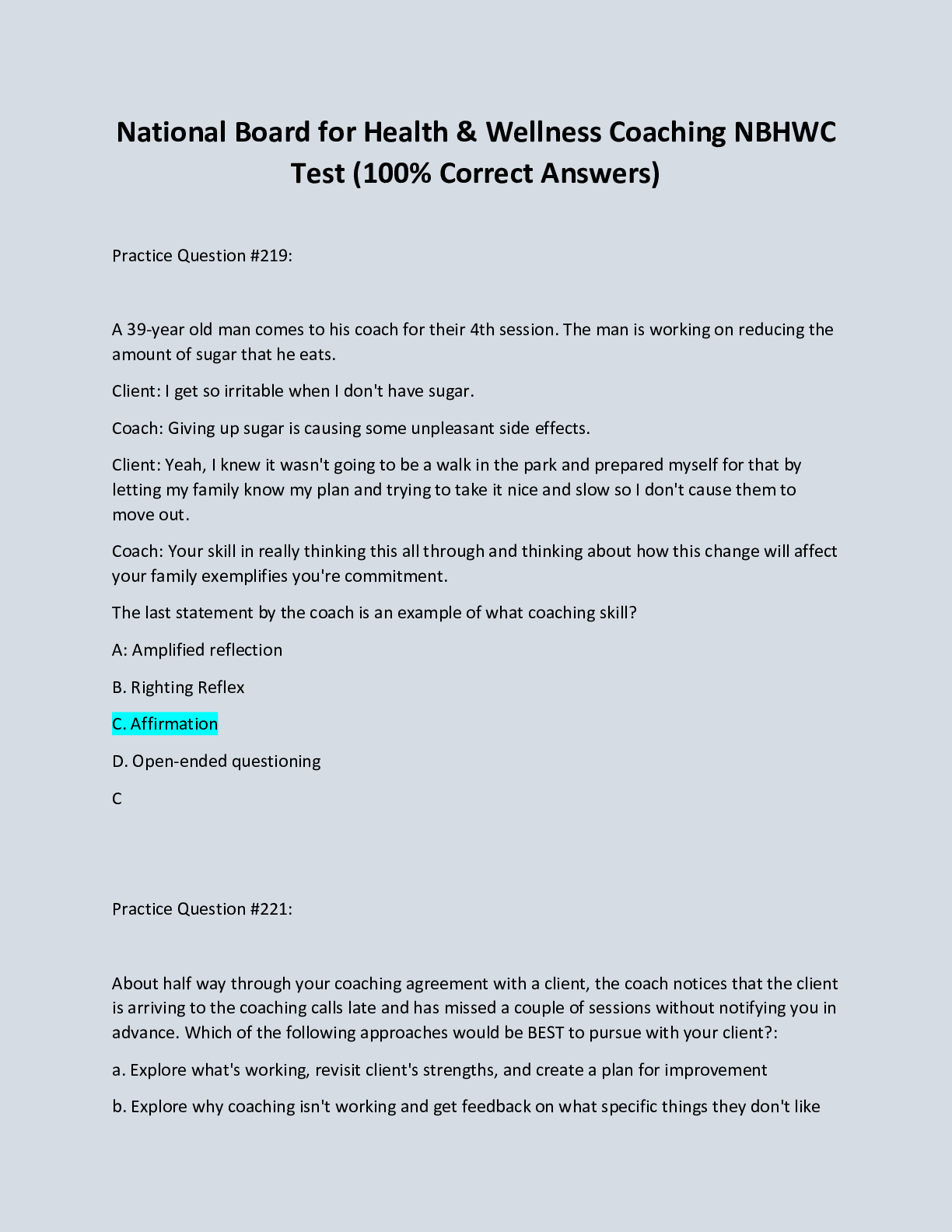
Buy this document to get the full access instantly
Instant Download Access after purchase
Add to cartInstant download
We Accept:

Also available in bundle (1)

NBHWC (National Board for Health & Wellness) Exams and Study Guide PACKAGE DEAL
NBHWC (National Board for Health & Wellness) Exams and Study Guide PACKAGE DEAL
By Goodluck Academia 8 months ago
$20.5
4
Reviews( 0 )
$11.00
Document information
Connected school, study & course
About the document
Uploaded On
Oct 15, 2023
Number of pages
105
Written in
Additional information
This document has been written for:
Uploaded
Oct 15, 2023
Downloads
0
Views
46

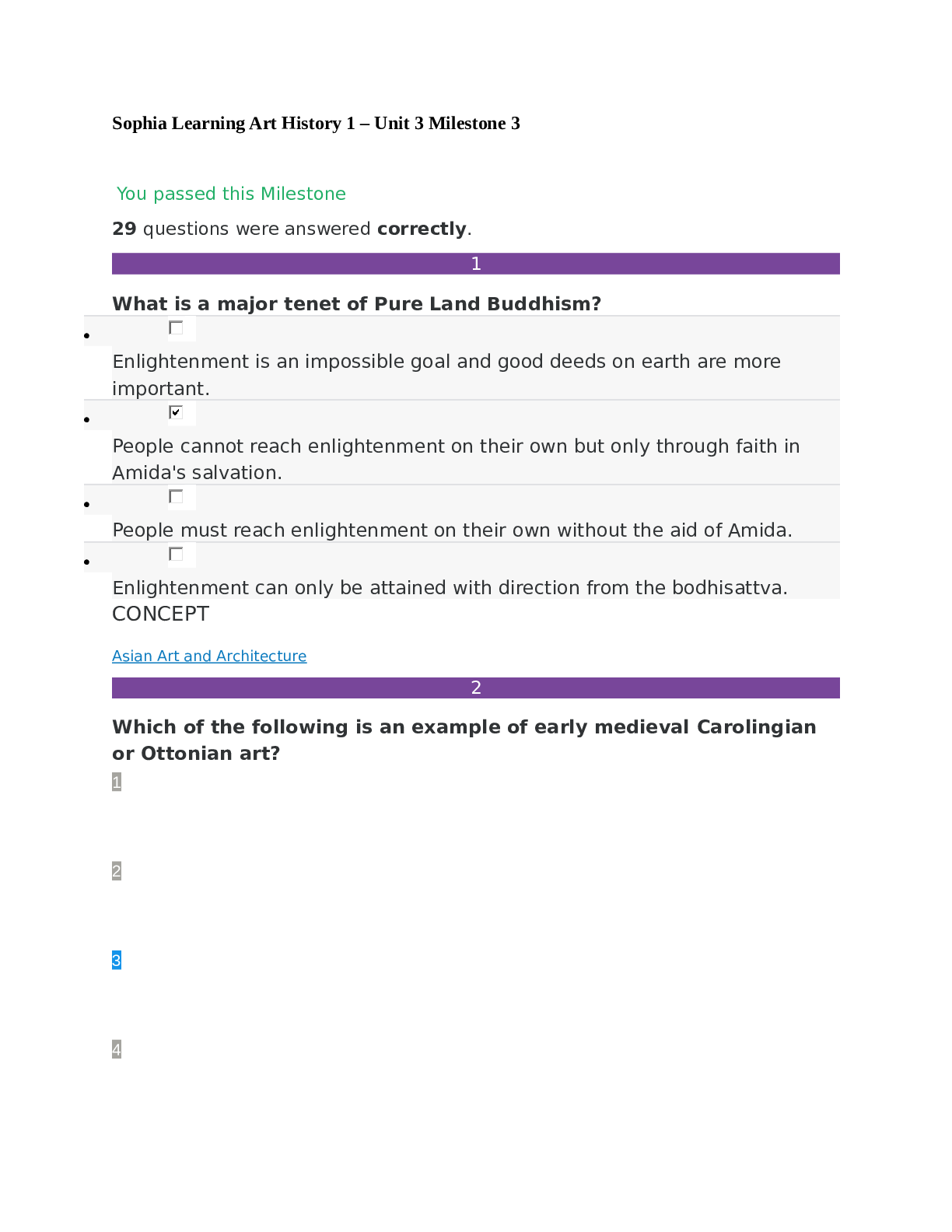
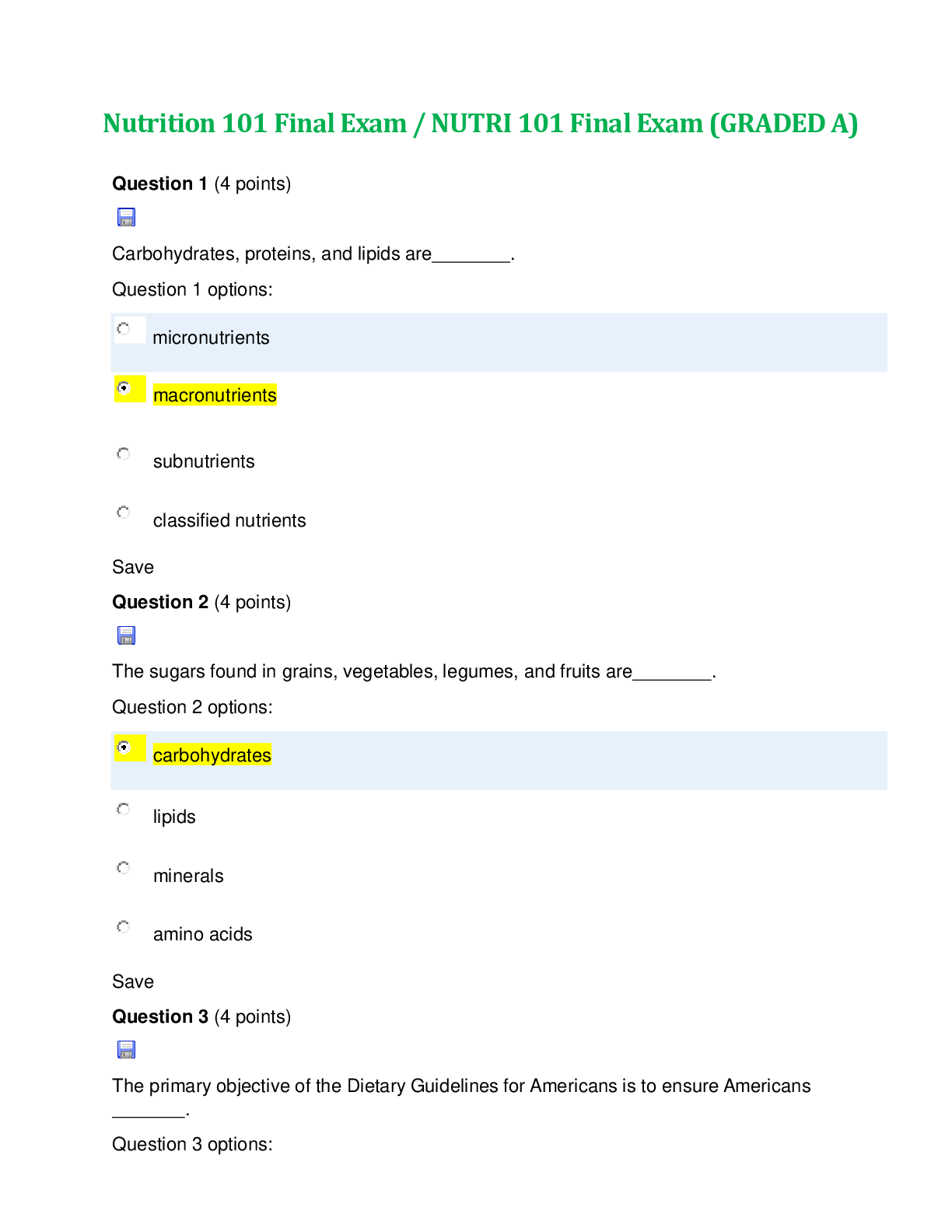
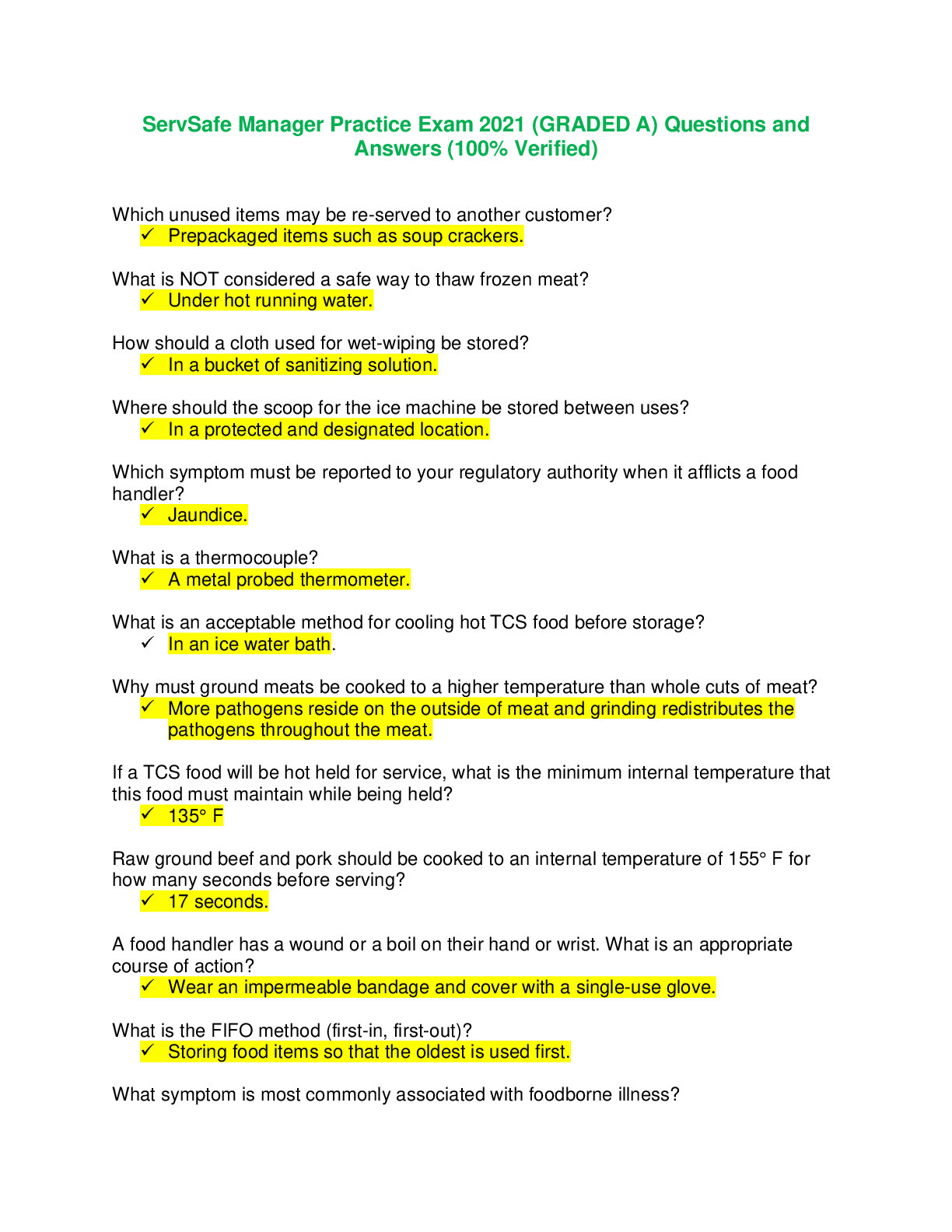
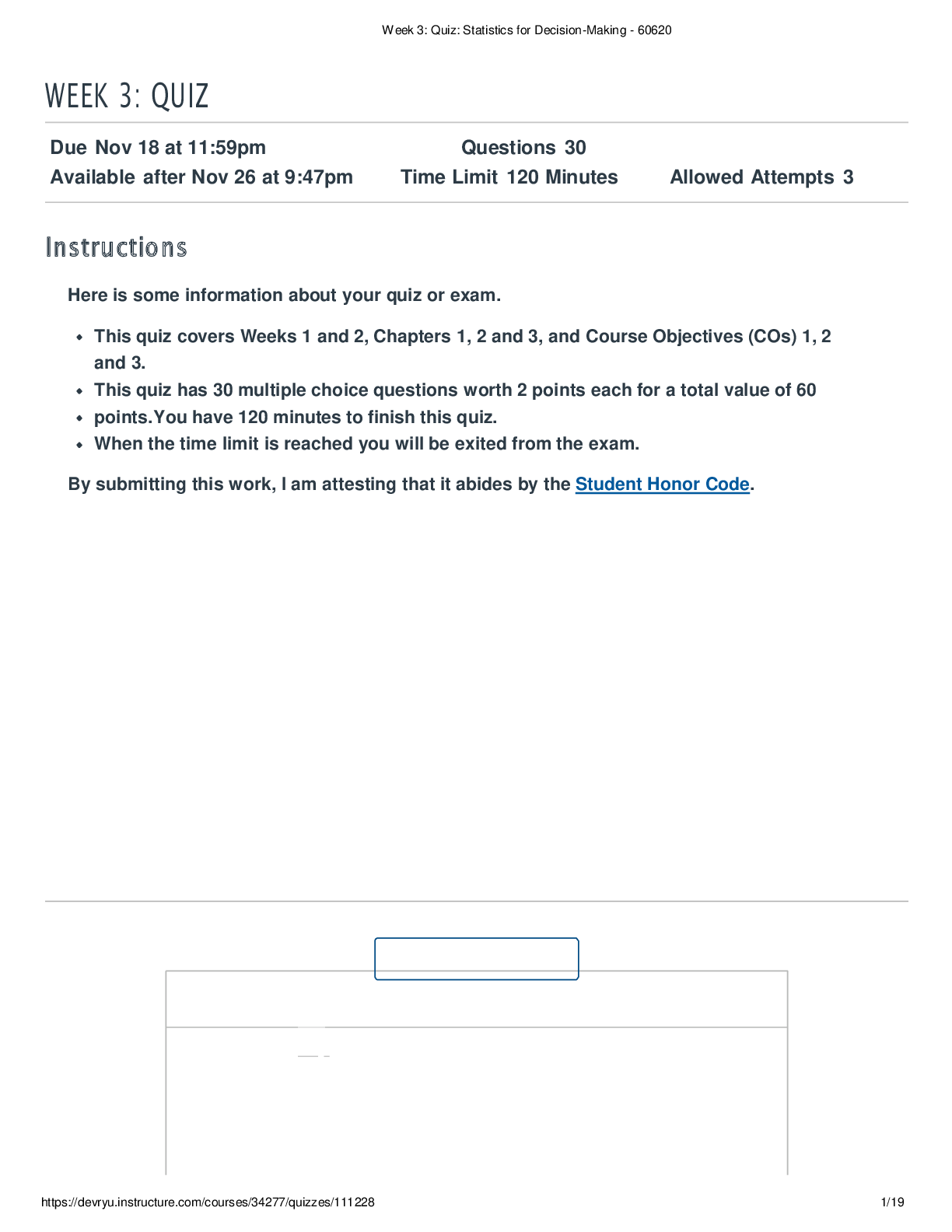
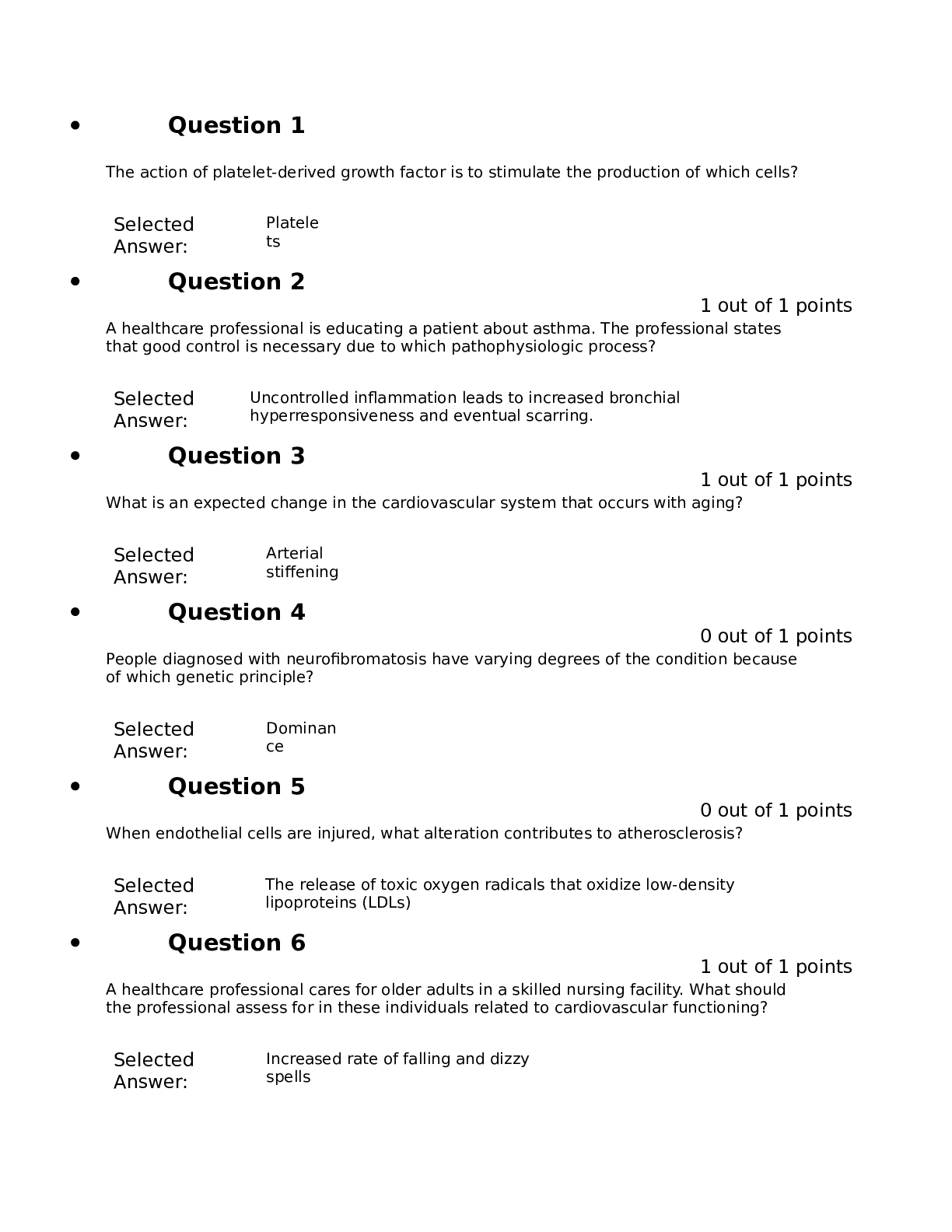
.png)
